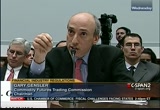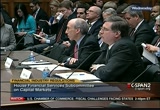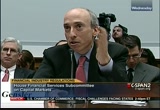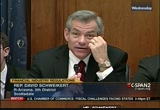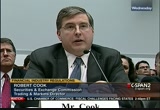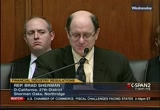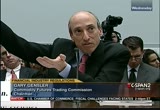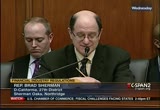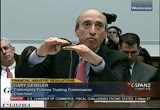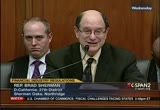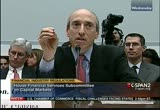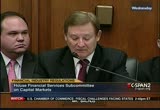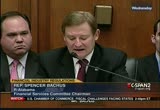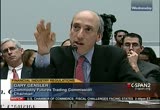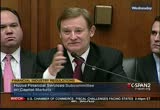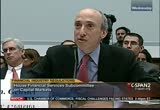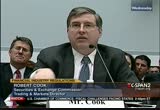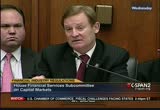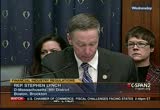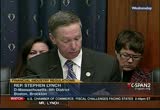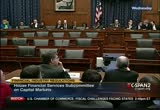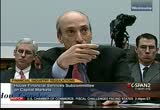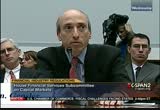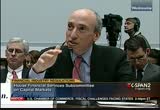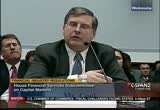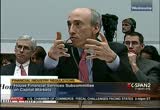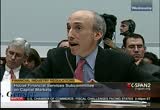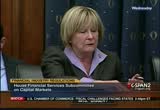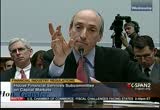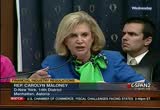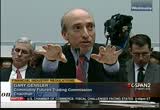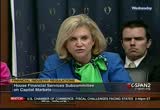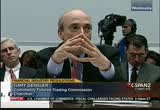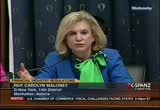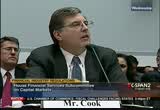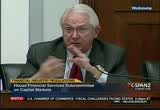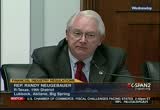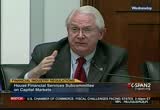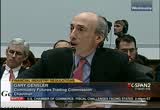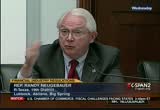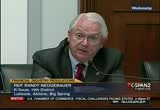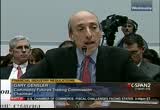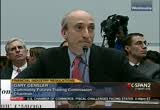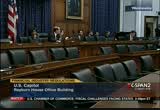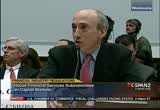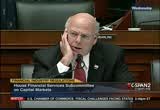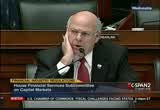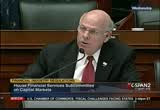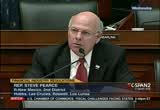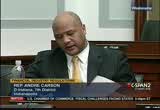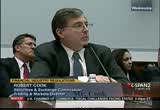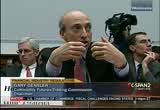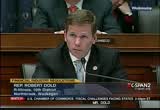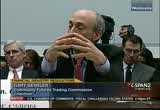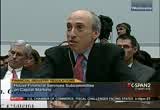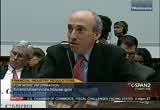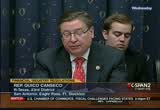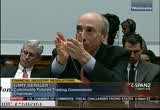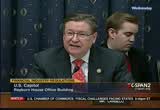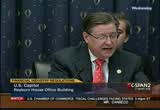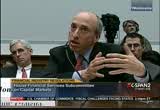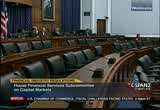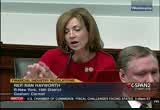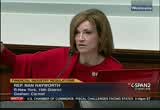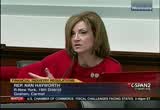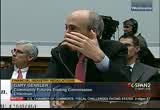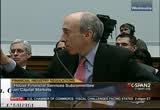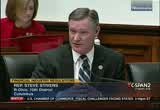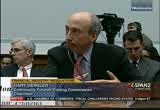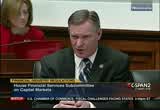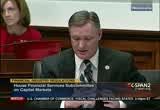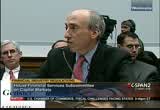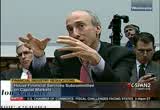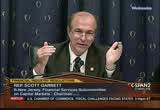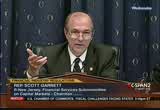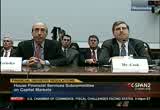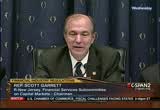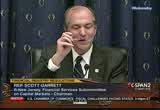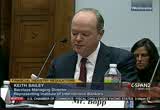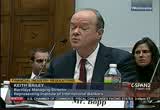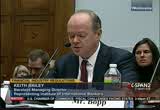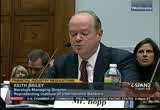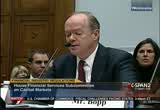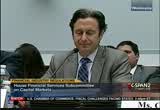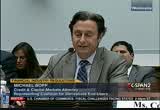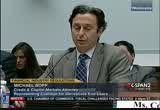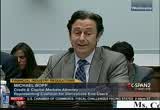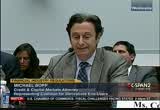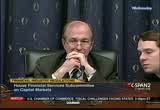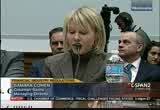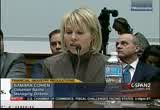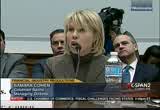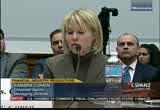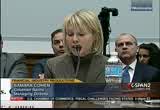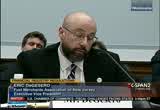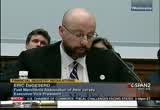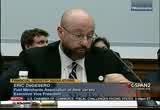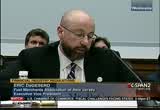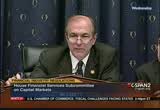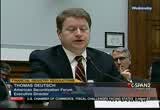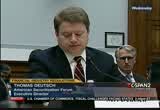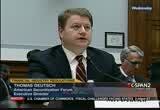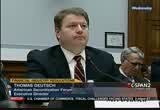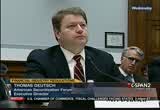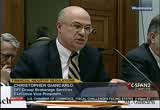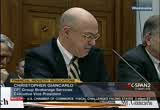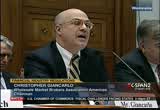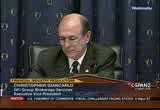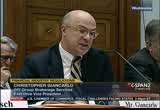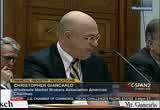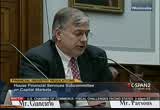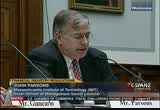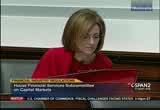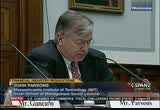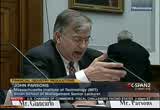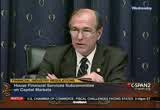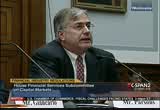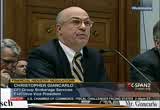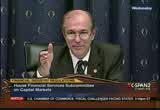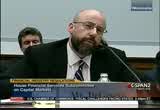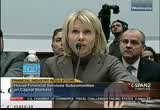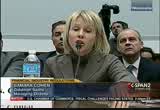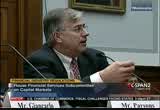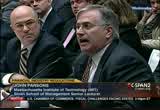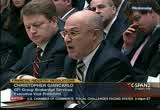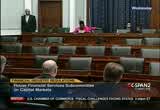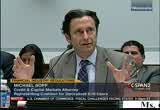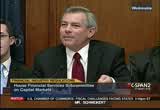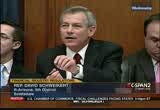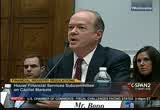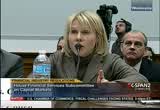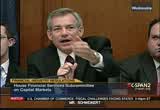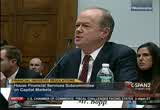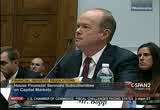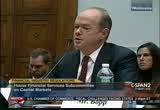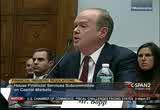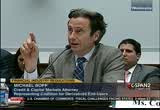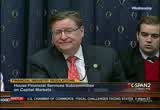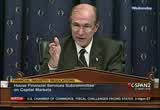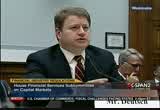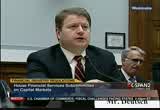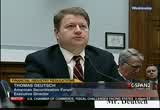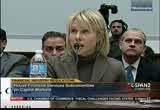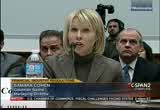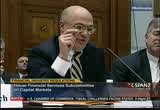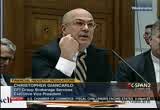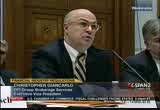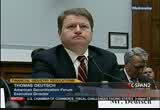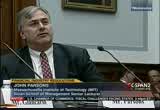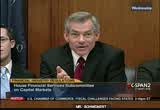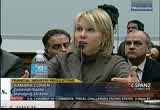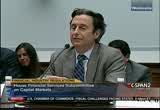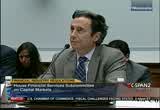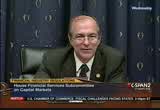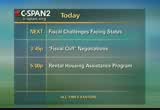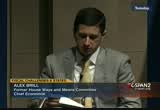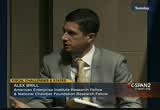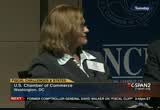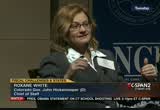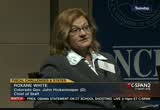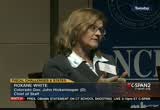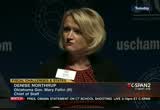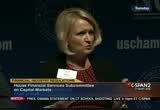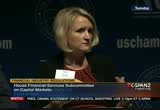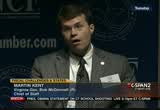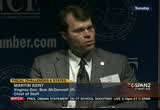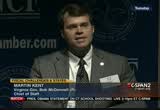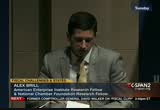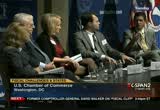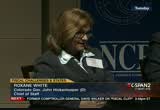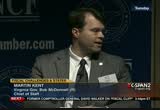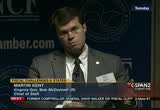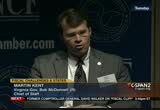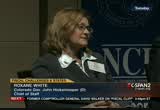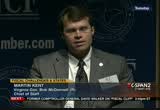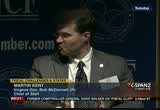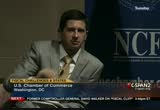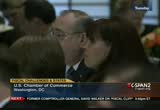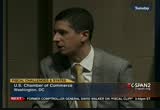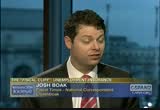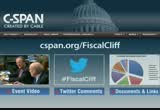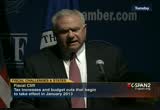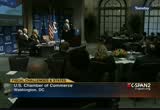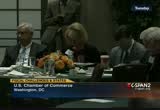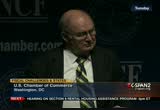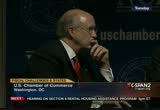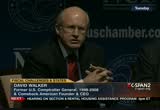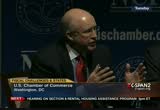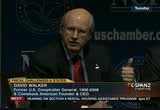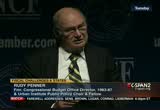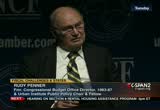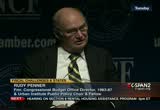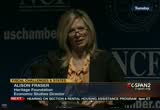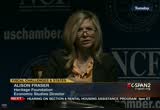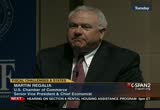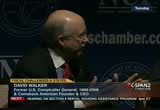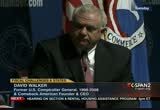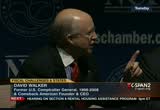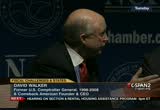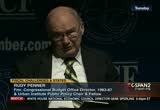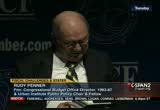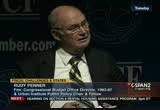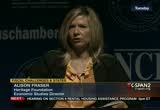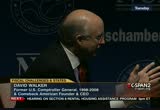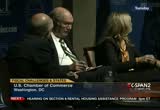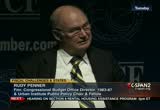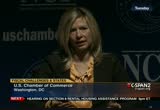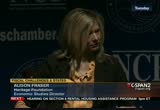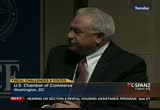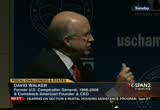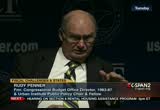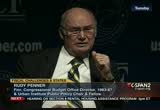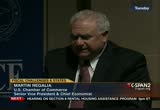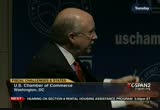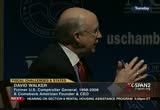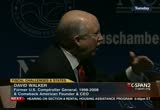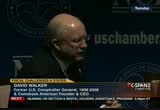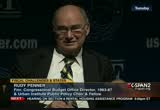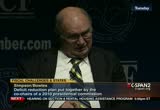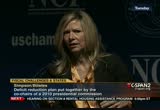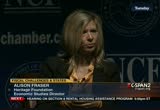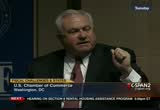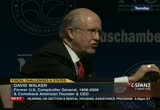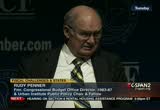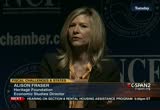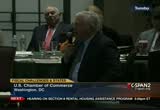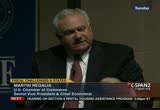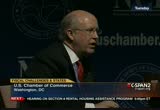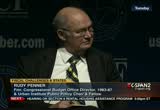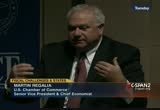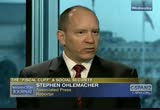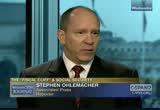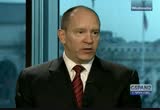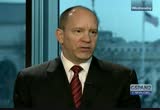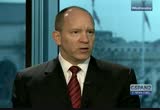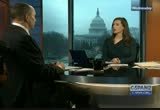tv U.S. Senate CSPAN December 14, 2012 12:00pm-5:00pm EST
12:00 pm
12:01 pm
fcc you are doing a formal rulemaking. you are doing full cost benefit analysis; correct? >> yes, sir. >> mr. gensler, wasn't that naturally -- because i've only had little bits of information on this -- the court case that recently went against the cftc? that was because you had not done that? >> for different reasons actually. >> let me just because i want to help define this. you hadn't done -- my understanding is the court ruled that you hadn't done enough cost-benefit analysis; do you agree with that? >> i do respectfully. though the litigants' raised that issue they spoke to a different topic whether there had been a specific mandate from congress that we put in place position limits we believe the congress didn't really mandate
12:02 pm
and the judge sent it back and said he saw it differently. but we did two full cost benefit in the rule as we have in all of the 40 or 50 or so rules. we benefit from them and we do them with the chief economist custis synnott on each one. >> so in this case i know a lot of what we read their is a discussion between u.s. regulators, foreign regulators and often concern on the harmonization between the two, and both the pro methodology use of language because many of us are starting to see a more complex world coming in where others multiple product wrapped in their and if there's a currency okay that might be exempt. there might be a package that actually has from both of you
12:03 pm
that sort of harmonization really does become important. is there a difference between the way your regulatory bodies are approaching these? >> we have worked together and harmonize on the definitions that you just mentioned about the swaps and mixed swaps and security based swaps so i think the public has a great deal of guidance and the rules but to the extent they need to come back on the package we would address it together. >> mr. cook do you have any incumbent new york city in different approaches is that cultural between the two regulatory bodies? >> i can't speak to the cftc statute but one of the reasons it drove us to the rulemaking in the context is that we look at the data, and in our market the security based market most
12:04 pm
transactions involve a party that isn't in the u.s.. so this is a cross border market. and how you do the cross border roles is how you do title seven. and so, we felt under those circumstances that when you are looking at the whole, it was important to take a holistic approach the cross border rules and because it was such a significant, had such a significant impact on how they were going to work that we needed to do a formal rulemaking. >> to mr. cook, thank you. i know i am out of time. i'm comfortable with what mr. cook is doing because of the data that you're going to collect. mr. gensler, it makes me a little nervous and particularly because of the different approaches. you know, and there are so many other questions i want to get to. but mr. chairman, i know i'm out of time. >> the gentleman yields back. the gentleman from california. >> i am a little concerned about whether your budget is adequate.
12:05 pm
you have expressed those concerns and i wonder if you could provide for the record a couple of things. first, if we wanted an effective regulation what should be the budget of your agency, and second would be a fee structure so that we could collect that amount from those who were relying on derivatives. i'm not really asking for an answer but if you could provide that for the record. >> we are about a two and 5 million-dollar agency. the president put a budget of 308,000,004 word and its for about a thousand 40 people from the 700 people now that it's in the hands of technology. we need to double our technology because it is so data intensive. >> but although you are dealing with a market that is five times as large as it was a couple decades ago, the 308 would be sufficient to properly regulate the market. >> i think it is appropriate also to phase wherever we are we
12:06 pm
might need to be five for ten years from now, this is to be a thousand persons aged our friends are 4,000 just to put it in context. we are really like this always regulators around. >> okay. >> hopefully you can provide a fee structures of the average person working in the district the costs are being paid by those who deal with derivatives. next i would like unanimous consent to submit for the record a senator from blanche lincoln in december, 2010, addressed to the cftc. she was the primary author of a title that we are dealing with. >> without objection. >> and we have got deep into liquid commodity markets they will provide benefits to our
12:07 pm
economy, pension plans and institutional investors, even ordinary people saving for their retirement not depend upon mutual funds that invest not only in stocks and bonds but also in commodities. will the new position limits arbitrarily limit to the mutual markets and take this kind of investment away from those who are saving whether the pension plans or individuals, and particularly how would that relate to index commodity funds? >> i think not. congress has debated the position limits since the 1930's when they were put in the statute, and it's to probe the integrity of the markets to ensure no one act respecting that factor has too big of a footprint in the marketplace. but, the nature of the ratios that were in position limits, the mutual fund or pension plans
12:08 pm
could invest it's just that they couldn't -- no one could have -- >> is there a difference in the index fund to do exactly what one big index fund does would you classify the fund as speculative investors? >> again, conagra's has given guidance on that that the producers and merchants and people that actually use the physical commodity or intend to use it or oversee it that are not under position limits, and then everyone else colloquially are called speculators then on producer merchants. >> i don't know if i would use the word speculator for the index fund with i will move on. the process of the no action letters you've got market participants who are trying to complete the work ahead of the compliance date, and then at the
12:09 pm
11th hour the date is extended. certainly it would be better if it were extended prior to the 11th hour. by understand the cftc has been issuing new letters and temporary relief exempt of orders and they tend to come in at the 11th hour. it can be frustrating for those who don't know until that 11th-hour whether that document will be issued to you think the full implementation schedule with adequate time for compliance would be more appropriate, or in the alternative to post a full no action letter until all of the dodd-frank rules are finalized? in general what can be done so that companies don't have to wait until the 11th hour? >> with respect to debt of both
12:10 pm
its completed in 2011, one year ago. and when they were completely said the compliance would be july 15th or 17th of this year. we extended the general compliance of that until about this time. so now they have had one year to get ready or two and a half years since the law there are further questions. we really want to smooth out this transition. so we get further phased compliance when it is targeted. we can stick with the january 1st deadline but we think is appropriate to give that additional relief. >> at the time is back. thank you. islamic the chairman is recognized for five minutes. >> thank you. chairman gensler kuhl on page seven of your written statement, about halfway down, you say we are very committed to allowing for substituted compliance were
12:11 pm
committed market participants to comply with dodd-frank of the foreign regulatory requirement. are you going to see the guidance, you're talking about cross border guidance which is on the majority of the questions has been about and includes a tiered approach for the dealer requirements, which was developed in consultation with the foreign regulators and market participants. when using consultation, you know, after that meeting, a lot of the participants at least express that they have a grave concern that they didn't appear to agree that was the approach that you were taking.
12:12 pm
have any of the foreign regulators endorsed the cftc's approach? and then i know in conversations with brazilians coming to substitute the compliance has come up, and i know that they are hoping for that. the consultations started in the early 2011, so nearly two years ago. the entity level requirements would come under the substitute and a transaction level would be stunned separately. actually it came from the international bankers that you will hear from leader and sally represents them. it came from their letters initially, this concept, so we largely embraced to be criticized from the other side, we largely embraced what market participants and the large
12:13 pm
international banks said substitute a compliance and they said said the transactions coming u.s. persons in alabama, new jersey, california, arizona, you know it would be dodd-frank. we put that out in the public consultation with a lot of consultation in the international regulators, canada, australia, japan, europe etc. and we continue to work the issue. i would say with banks registering the largest banks registered in the term, we are going to have more issues to sort through and we are committed to soaring through -- >> you are not talking of those that registered when you are making that statement. just the firms that register. >> but i have some expressions from some of the foreign regulators that they feel like some of the guidance may be in conflict with their loan
12:14 pm
regulator, their own that regulation and i guess that is what i am saying. if they are in conflict how are you dealing with those conflicts? >> the one example was in japan they have a clearing requirement. they actually put in place november 1st and we now have a requirement that we finished in november. there is a conflict because we both say they have to be cleared and registered clearinghouses. yet they have yet to register the london clearing house and we have yet to register the japanese clearing house. we are relieved they can use the japanese clearinghouse although it isn't registered here and give that clearing house to have asked for a year in that case. and so we are going to do that in the next few days. in direct conflict we are committed to sorting that out,
12:15 pm
and sorting it out in a practical way. some of them were at the last minute. if we see that we are trying to work out these conflicts and more time is needed, i suppose you will announce ahead of tire. the fec, have you endorsed the cftc's approach? >> the commission hasn't made its proposal. we have been very much engaged with both the cftc and foreign regulators on how to approach so our concern is between a lot of jurisdictions at the cost of implementing the g20 commitment, and i think there is a real opportunity at this moment in time to find a way to strike the right balance and to bring the whole system to the right place
12:16 pm
because i think any one piece of it that doesn't come along or goes along too far can disrupt to the dynamic to the different jurisdictions have different ways of thinking about this. so if the europeans for example talk about mutual recognition instead of substituting compliance, with all that means is something that is a part of a dialogue, the devil is in the details. what does the substitute compliance been and where will you look? i think that is part of the work that we all have in the next few months but there has been part of this international dialogue to catalog conflict, overlap and consistencies so at least we know what we are talking about and there is conflict and they say that is a problem to figure out where the inconsistencies are. >> you have a singapore banker, swedish banks said we are not
12:17 pm
going to register. you are identifying those conflicts and with that i will proceed. >> thank you. the gentleman is recognized. islamic thank you. i appreciate it. i want to thank you again for your service. you have done some great work on this. i did hear your opening remarks with respect to the extraterritorial replication of dodd-frank's derivative reforms. i remain concerned that financial firms will still try to avoid those reforms in title title vii using a foreign subsidiary structure, and i read
12:18 pm
part of your proposed guidance, and i think you were right on the mark and i am quoting you year you said in your view of the concerns of the risk associated with the affiliated group structure heightened for the u.s. personal guarantees of the foreign affiliate or subsidiary. you go on to say you ask whether the term u.s. person should be interpreted to include a foreign affiliate or a subsidiary guaranteed by a u.s. person. and i think you are right at the heart of the issue. when the american taxpayer bailout aig for example, we didn't just bailout the london affiliate the concept had already infected the entire company so that when we came in we had to bail out the entire company.
12:19 pm
the kind of risks posed by the derivatives market that we tried to address in dodd-frank they don't stop at the borders. these are international risks when a company is agreed that pacelli it is for all intensive purposes a u.s. company. i know in your remarks as well you address the job issue where the jobs could also follow that for an affiliate. i would like to get your thoughts on how we might tighten up the language in your proposed guidance and if to try to get at the problem in a more effective way. i am just trying to maintain and not lose it. i think if we do not cover the guaranteed affiliate's offshore that you can basically blow a hole out from title vii, and all of the congress intended on
12:20 pm
transparency and risk i served on wall street for 18 years. we often structured around the legal entities and that is the nature of the modern finance. many of these large finance institutions are to come three, four, 5,000 entities and it is a matter of structuring, and if you can put a legal entity somewhere and guarantee at the risk still comes back and in the middle of a crisis, in the middle of a crisis you pull one thread of a financial institution and the whole sweater comes undone. canada, the u.s., it runs elsewhere. so they run to europe but also those risks run back here. so that is how we are comfortable with the substituted compliance if there are the rules over there to cover our guaranteed affiliate's. i think if we don't cover them
12:21 pm
all so it isn't good for the jobs and i see the congressman from new york. i think the large financial institutions within just move the jobs to some jurisdiction and put a legal box on the structure in that jurisdiction to be done with that, to be happy that the cftc gave the relief that they have requested but i don't think it is good for the new york jobs to flow back here and we are like a fire department somewhat. they have to look at the rules and the context of crisis what are the rules in the crisis so that the risk doesn't hit our taxpayers. >> what kind of cooperation are we getting right now in terms of, you know, substitute compliance and -- they didn't say enough good things about our friends and colleagues in the european union and london and france, brussels, germany
12:22 pm
throughout and other countries as well. they are anxious as you know, they are anxious as to how this will work. we have said let's give it more time, let's work through the substitution of compliance issues, but they have been excellent. >> thank you. my time is expired. i yield back. thank you mr. chairman. >> thank you, mr. chairman and chairman gensler and director cook for being here. right that there is a different timetable that has been adopted by the sec and the cftc and compare of all requirements? >> you are right that we were given an easier task because we are just a future in the swaps
12:23 pm
regulator and they have such a broad portfolio. as we have completed about 80% of the rules. we have one year to complete the task but here we are two and a half years later. >> is that going to be confusing for the firms and costly for? >> there may be challenges. the swaps that we overseas, interest-rate swaps and physical commodities swaps and credit industries represent about 95% of the marketplace used across this country the securities based swaps are not only a smaller part of the market but they are generally not used by your small and medium-size company across the country. >> most of the market is under the cftc jurisdiction 95% versus
12:24 pm
5%. i think as a practical matter, the sec begins to move towards the finalization of the rules that have already been adopted by the cftc. we need to take into account that framework if there is any perceived need to be different or the need to explain and justify the potential cost to the participants. there are different products sometimes it makes sense to have differences. the information that you report for the swap might be different than you report for an equity based swap and there may be other examples but ultimately it their different you need to the level to justify those differences. >> it's december 31st or january january 1st. estimate would be finished july of 2011. estimate it is through the six on the extensions called a exempted orders. but now that we have completed
12:25 pm
so much of the rules, we have more to lead to move to the targeted as either no action or the like. >> but you are talking about january 1st or december 31st. >> it just seems like kind of an odd time to launch such a big project. most companies and firms focused on closing the books for the year and going -- are they having to do a lot in these last couple of months that are going to cut into that time? >> actually for many of them through the compliance and give additional times as they are requested there are some that are delayed from december 31st for instance for international dealers associations have come in and said many of the seals
12:26 pm
practice regime want a delay from october to the end of the year we did that and they've now come in and said there are only about 20 plus percentage done. could we give four more months, and we have something in front of the commissioners to give that four more months. so we are working through to phase each of these issues. >> so this won't cause if there are operational problems that can be solved easily. >> this is a very significant and important change for the public. but as the firm's registered come january 1st and start sending information and the date of repositories it is for the american public we are going to continue to work with each of these market participants to get this in place in as snows of a way as possible. >> so there is flexibility. >> absolutely.
12:27 pm
>> i yield back. >> i have one more question. with regard to this issue of the swaps and a guarantee, the commission is that the fcc has held a contrary view of that. my question to the commission is can you point me to the page of title seven where the word guarantee is explicitly set out and gave you the idea that the guarantee of us when a swap? >> i am sorry i will get a little geeky. it's the guarantee the security and is in statute that predates dodd-frank. in the guarantee of the based swap is a security, so that happens when their side, as i understanding it any way. what we look to is 722 d. does it have a direct significant effect on the activities in the u.s.. and so that's where we use that
12:28 pm
-- >> it's guaranteed to the affiliate's. so in the large financial institution here are the guarantees for the offshore affiliate that assures that we are sitting in this room of the offshore of chile yet fails, the risk is great to come cascading back down here of the legal entity. >> as i said it takes a contrary view. summit actually theirs is more direct. >> the gentlelady fields backed. >> thank you. in dodd-frank, it was made clear that the clearing houses must provide open access to be transparent and that the repository is cannot bundle or require that additional services be brought from them. there are difficulties in this
12:29 pm
area and i would like to submit questions in writing on technical items koln. i would like to go back to the opening questions have the statute that we adopted its on the facilities is being able to use any means of interstate commerce why is it not clear in the rule itself? >> as the draft and internal documents tri-state for broadly just for the commerce to the congress that by any means of interstate commerce we got a lot of comments, and i can only speak for this commissioner, i believe that the final rule should be as the congress
12:30 pm
directed to the technology neutral if by any means of interstate commerce covers, foynes, internet, a carrier. however, there is still a requirement, and it's a very real requirement that its multiple parties having the ability to transact, buy or sell with multiple parties. .. major financial crises that
12:31 pm
rocked the confidence of the markets have started in london. y do you think that is? >> i think more generally risk knows no geographic border or boundary. it can go around the globe. so risks here in the u.s. of our housing crisis also splashed over to europe. it is true in both directions. but the nature of modern finance is that these large financial institutions will have several thousand legal entities sometimes or just hundreds and will put a legal entity somewhere that satisfies their capital need and sometimes they want lower regulation in an island nation. you know, could be the cayman islands. long-term capital management had their entity set up in the cayman islands. bear stearns had a number of their legal entities in the cayman islands. they found it was
12:32 pm
appropriate for them for tax planning and other reasons but the risks still came back here. >> if the risk comes back to us is the substituted compliance, as strict in london as it is in america? it's unusual that the crisis happens in london. mr. cooper, would you like to comment on it? and i will say in basel iii we're hearing from some of our financial institution that is the capital requirements are more onerous on american banks because american regulate, are going to enforce them and many competitors feel they will not enforce it. so this is a problem if someone can go, to another, have a different standard in what is competitive global market in the case of capital requirement requirements. have a situation that is disadvantage to american firms. i'm concerned about the
12:33 pm
threat to american taxpayers. you can say you have substituted compliance but how are you enforcing the substituted compliance? you hear from some financial institutions, won't say it publicly but don't feel it is regulated in certain places and i'm wondering is london one of them. why are so many financial crises in london? i would like to here from mr. cook. >> i think that will be a very important situation if substituted compliance is granted how do you evaluate the foreign regime and whether it's deemed sufficient and along what metrics? the say being you're going to give substitute compliance is just the beginning. you have to figure out, well, you have to understand the other regime, how it works and you think to need about as well how well is this regime is being enforced. the one of the advantages of substitute compliance you retain jurisdiction. if in the future you
12:34 pm
determine that the regime is inadequate or not adequately enforced then you can determine that the substituted compliance is no longer available. i think the question you're raising about the different capital and other requirements while, we're not, i think, the banking regulators who are behind the basel regime, it does raise the broader question of how do we make sure there is full implementation of the g20 commitments in the derivative space, not just in the u.s. but in other countries as well? and i think that's part of the advancing international dialogue and i think there is a lot of progress being made but that's something that would need to be taken into account before recognizing any other regime for substituted compliance purposes. >> thank you. thank you for your service. my time has expired. >> thank you. the gentleman from texas, mr. neugebauer, actually. >> thank you, mr. chairman. appreciate you both being here today. chairman gensler, the last couple of years i think this
12:35 pm
committee has expressed a lot of concerns about the rule-making process as you begin to implement this title and some people felt like some of these rules were inconsistent, confusing. others felt like the cftc was dodging some issues by just issuing guidance rather than being very prescriptive. then others have said, you know, you're over reaching the original intent of dodd-frank. i think the question that, and what the concern was is that was going to cause, you know, uncertainty in the market participants and i think what we're beginning to do now is see that playing out. for example, as you're aware, recently ice decided to move millions of dollars worth of energy swap contracts over to the futures side and, so the question is, when you look at the a lot of the regulations and the policy
12:36 pm
that you're making, it almostp appears you believe that the intent of congress was to, somehow drive people out of the swap market. do you believe that was the intent of congress? >> not at all and i don't think that's what our rules are about either. i think swaps are critical to our well-functioning economy so that end-users, whether farmers or ranchers or large financial institutions can lock in a price and hedge a risk and focus what they do well and create jobs and innovate and it's, it's to promote transparency in the market and lower the risk of that market but it's just like the reforms of the 1930's. transparency in the securities and futures markets i think helped promote economic growth these last seven or eight decades. >> so, as we've, we're beginning to see some of how the market participants are reacting to this has the agency said internally, hey, we didn't anticipate, that
12:37 pm
ice would move trillions of dollars worth of transaction out of one space to another space. are you beginning to wonder what, whether the road you're going down is actually accomplishing the intent of congress and is it beneficial to the marketplace? >> every day i walk in i wonder about that very question because markets adjust, evolve. this is a very complex market and so that's why we've changed nearly everyone of the final rules have been changed from the proposals. we reproposed some of them. we're not shy of doing that. if we don't think we got the first one right like we did on block rules. we're not shying away from phasing compliance and where we think we can under the law to giving the appropriate relief to smooth this into place. in terms of futures and swaps, i think you had a
12:38 pm
regulated futures market that worked well through the crisis and for many decades. and unregulated swaps market that frankly did not work well in 2008. so when congress said regulate this, and bring it up somewhere here, it is sort of inevitable that some of these swaps might now be called futures. but if i might say, futures is transparent. it's got a low-risk profile because it is centrally cleared. and the dealers, or the equivalent of dealers are, tend to be regulated. so i think whether it's futures or swaps, congress has said it should be transparent and have some oversight. >> well, i think that, no question, there is a place for both of those products in our financial markets. what i'm concerned about is that we seem to be, by some of the policies and rules that you're initiating, trying to move the marketplace more to the
12:39 pm
futures space whereas this is a valuable part of risk management that, you know, many of the market participants that i talked to are very concerned about. one is that, in the form that it's been in the past, there is certainly everybody is for the transparency and making sure that we address some of the risk factors of that. but i don't think there's support that we move all of the market to the futures. >> you and i completely agree on that. >> well we would like to see some things that indicate that is the commission's position and one of the things we keep talking to you about, chairman, the cost benefit analysis before we implement a lot of this and anticipating some of the consequences, unintended consequences of some of this rule-making process rather than being in a hurry to put out a lot of different rules. and so obviously the market is telling you something here and hopefully we'll look for your response to as
12:40 pm
to rethinking whether you've done some things here that are pushing -- we don't need the government telling people what markets they can participate in. what we need the government to be doing is making markets transparent and fair and we, but we don't need the government telling people that we think these are the products you should be using. >> thank you very much. miss moore recognized for five minutes. >> thank you so much, mr. chairman. i just want to pursue the line of questioning mr. neugebauer venter into because it seems to me that you are suggesting that futures are transparent, they're well-regulated and we all know that swaps were not. and now that this new swaps future market is developing, i'm wondering if you are concerned about the regulatory arbitrage of the,
12:41 pm
only about 50% of margin being required? they're being treated as equivalence, don't you think, don't you think, margin may be just one of the regulatory gaps that exist. wondering what your thoughts are on that? >> one of the innovations in the market in the last few months has been this product, future on a swap. so it's a future, that trades on a futures exchange and it's cleared and its's transparent. but yes, we're taking a look at it to better understand it. it's a new product. if i can call you chairman as well. the chairman said, we're, the market should innovate that we're not deciding future swaps or futures on swaps but we're certainly taking a look at the
12:42 pm
development. we have historically had reason to have higher margin requirements on swaps because they were not as liquid as futures. margin is meant to be there just if one party defaults to unwind the position after somebody goes bankrupt. if there's, liquidity comes to the swaps market and active liquidity like the futures market then you would want to insure the margins were more aligned. >> mr. gensler, much of your testimony was devoted to how you thought the, that your regulatory work has been focused on making sure these swap executions facilities get up and running and they're well-regulated. do you have any, you say, you don't want to pick what kind of products people ought to use in the marketplace. are you concerned that these scfs may just become irrelevant as you see the exit from swaps into the new
12:43 pm
product? is that any concern about market stability? >> i think it's critical that we finish she is rules on swap execution facilities. this has been a long journey together, 2 1/2 years when congress only gave us one year. i think the swap execution facility rules need to be finalized. we have something in front of commissioners. we'll find a consensus amongst the five of us and try to finish this up in january or february so that these, these commercial enterprise -- >> it won't be a dinosaur by the time you're done, will it? it won't be irrelevant? >> knowing some of the men and women that work at the institutions, no, i think they're very clever and innovative institution but i think we need to finalize these complete the tasks that congress gave us and let these swap execution facilities and designated contract markets provide a service to the public and compete.
12:44 pm
>> let me, let me ask you a question about the, some of the extraterritorial stuff we've been talking about today. mr. gold and i, and i'm sure he is going to pursue, this we passed h.r.-4235 and you know, a couple of the commissioners, summers, and commissioner scott dimalia, really said they think there should be a legislative fix to this and i would submit that 4235 was that fix. and so if you were to join with these commissioners we could repeal the indemnification provision that was passed out of this committee i believe unanimously and i'm wondering if you would endorse that kind of legislative fix to this?
12:45 pm
>> well, we've been working with the international regulators and we did within the law the best we could to address this issue through the interpretive approach. it was interpreting this indemnification. foreign regulators who have required data to be in a data repository can access that data without the indemnity. >> i guess my understanding is is that they have grave concerns about the guidance versus this legislative fix. why don't we just do 4235? >> well that of course is not, it's not the commission. we've done what we can. >> i know but, you know -- >> i imagine in 2013 congress will take this issue up as they take up whether it's our reauthorization of the commodity exchange act or other things that congress takes up. >> thank the gentleman and gentlelady.
12:46 pm
miss pierce -- mr. pearce renned for five minutes. >> thank you, mr. chairman. mr. gensler i'm fascinated with your discussion on paege 14. it paint as vivid picture. nfl expanding eight fold to play 100 games a weekend without increasing number of referees. this would leave one referee per game and some cases no referee. imagine the mayhem on the field, resulting injuries to players, loss of confidence fans would have with the integrity of the game. i would like to begin my discussion about this idea of how many referees it would take. so i go to judge the future, i take a look at the past and so i'm looking, cftc is pretty involved in mf global, right? you were there? >> the cftc -- >> you were the referee. >> the cftc oversees the
12:47 pm
futures market. and -- >> mf global, cftc was deeply engaged in mf global, is that correct? >> it is one of the many futures merchants. mf global was one of many that oversee that market. >> mf global had about 30,000 future accounts and 318 sec c regulated accounts. one of the ma'am. seems like it is greatly the many. it is almost 100% under cftc regulations and yet the referees in the room made a decision according to miss shapiro, when i asked her, that we will allow it to be described as a securities trading firm, not, not the 30,000 accounts, but the 300 are going to dominate the process. and you see that's a little, just for those people who might be watching out there
12:48 pm
in america, that was a little sleight of hand. you talked about the clever innovative companies that you try to regulate. but there was a clever sleight of hand because declared a securities firm then it was allowed to process bankruptcy in a way that favored investors. mr. cook, would you have any idea who made the recommendation that this would be a securities firm and not a, not a futures trading firm? >> sir, the mf global unit that had customers -- >> i'm asking was do you know who made that suggestion because miss schapiro said somebody from the sec made that suggestion. were you in the room that day? >> i was on the phone at the time. >> were you in the room? >> no, i was not. >> you were not a participant but you were one of referees on the field is what we're talking about. mr. gensler drew us a very
12:49 pm
good word picture there. you were one of the referees. >> there was ongoing call among the regulators that included the cftc and the sec to determine what to do in light of the short fall in accounts and the obvious inability of this firm to open up the next morning. >> yeah, but who made the decision it was going to be a securities firm and not a futures firm? >> the decision was made to defer this so sipc because -- >> and that allowed the investors to be protected at a loss, at the loss to the consumers and i'm reading, if you will allow me, i'm reading your testimony, sir. you say that in the discussions before us on derivatives trading we're here to avoid systemic risk. we're here to enhance investor protection. we're here for transparency. we're here for consistent and comparable requirements. we're here to protect the consumers. and yet you were on the phone and mr. gensler is in the room. you were the referees.
12:50 pm
we were the referees but we need hundreds more of us. you two guys were sitting there when 30,000 accounts were turned over and we protected the investor and we did not protect the consumer and you want us to sit up here and give you more money? you want us to sit up here and belief the fairytales you're giving us somehow you're going to act differently under derivatives trading? and i say if i'm going to look at your future i'm going to look at your past. you two guys, not the ones sitting across the hall from you. and i just wonder, about this administration which constantly talks about the 99%, when it comes down to the rub, it protected the 2%. it didn't protect the small guys. it didn't protoke the hog farmers. 30,000 accounts versus 318,
12:51 pm
mr. gensler. you worked at goldman sachs. you knew those guys. they started picking up assets that day. mr. chairman, i yield back. >> gentleman yields back. gentleman recognized for five minutes. >> thank you, chairman garrett. thank you ranking member, madam waters and mr. gensler and mr. cook, the witnesses. i want to remind my colleagues of the importance of cooperation and collaboration with our international partners. i believe the u.s. should demonstrate our global leadership by raising our financial standards and not entering into a race to the bottom of sorts of banking standards. i also believe that the provisions of dodd-frank that were in place five years ago would not have faced, we wouldn't have faced the economic crises we are just beginning to crawl out of. so i'm very reluctant to carve out more exceptions or exemptions to dodd-frank before rules are fully put in place to fully implement the law or without more speculation that could go
12:52 pm
wrong. my colleague, peter king, would have us suspend enforcement of dodd-frank's volcker rule until our international partners have instituted their own regulations addressing proprietary trading. as i mentioned in my opening statement, i strongly believe that the u.s. should lead by example and not wait for others to take the league. what do you guys see, being pros and cons of mr. king's proposal? >> both the cftc and the sec have a role in implementing the volcker rule. i think, the commission hasn't taken any position on this proposal. we're actively engaged with, at a staff level with the agencies, other agencies to move forward with the volcker rule-making, taking into account of enormous number of comment letters we got, 18,000, very complex set of issues but i think
12:53 pm
we're making a lot of progress, and as a staff person our goal is continue moving forward with the implementation process as expeditiously as we can. >> and though i'm not familiar with the proposed legislation, the volcker rule is one of the more challenging, maybe the most challenging of rules i think the regulators were given, to prohibit one activity, proprietary trading, to help the taxpayers not bear some risk. and yet, permit things that are important in markets. market-making, hedging underwriting and the like. so prohibit one thing, permit another, and then where's the border or bondary between the two? so it is one of the most challenging, i think, and there is five regulatory agencies working at that. internationally they don't have the similar rule, and so we're dealing with
12:54 pm
congress's will in trying to get that in place, when they don't have that overseas. >> thank you. thank you, mr. chairman. i yield back. >> thank you. the gentleman yields back. you're recognized for five minutes. >> thank you, mr. chairman. certainly want to thank mr. gensler, mr. cook, thank you for taking your time to be here. mr. gensler, back in march the committee held a hearing about the potential danger of our regulatory framework if foreign regulators are required to comply with the indemnification and confidentialty provisions in dodd-frank. the european securities and market authority expressed our concerns that the cftc can not overrule the dodd-frank act itself and concluded that the confidentialty and indemnification issue could only be fully addressed with a legislative amendment by repealing the original provision in dodd-frank. as you know this committee passed, as my colleague miss moore noted, h.r. 4235, which would provide this legislative fix, a solution that i believe is supported
12:55 pm
by the sec and certainly supported by our foreign authorities as well. the cftc's interpretive guidance says that the cftc will not require foreign regulators indemnify a registered sdr or its primary regulator. this regulatory workaround is essentially to ignore the law, to ignore a provision of dodd-frank. on what basis of authority do you propose that the cftc can ignore the law? and how can foreign regulators relie upon this interpretation? >> with all respect i think we actually took the law, not, we took this law, into place, into consideration. also as i understand it, i'm not a lawyer, but rules of international comity. in he is tense -- essence when there is conflict between laws how do we address that? we're doing that in the crossborder rules as well. we interpreted the indemnification provision congress put in place but
12:56 pm
said if a european regulator or asian regulator, canadian, actually requires that information to be in that data repository, that dodd-frank doesn't trump their law, they can have access to that information without an indemnity. it is actually taking into consideration what i come to understand is the international regimes on comity and recognition gone all the way to our supreme court. >> on 4235, mr. gensler, miss moore asked, do you support that legislative fix. obviously you said, well, perhaps they're going to do that in 2013. unfortunately or fortunately, however you want to look at it, we'll be in session for a little while. we have opportunity to fix it right now. would you support a 4235 fix which has passed the committee here unanimously? so again why put off to tomorrow we would try to deal with today. would you support those?
12:57 pm
>> i will support the interpretive guidance. and we addressed issues raised with regard that it doesn't have to indemnify, if there is information in that data repository they have asked to be there. you know. >> two dissenting commissioners, mr. gensler, stated that the commission is purposely chosen to interpret the statute in a man they're con strains other domestic regulators ability to examine the swap market data. if the doj needed to access date from an sdr for an investigation would it need to enter into indemnification agreement? could the doj do that? if not, why would the cftc limit access to relevant date it. >> i might have to have our general counsel get back to you on the specifics of that question but i know that other u.s. regulators have two paths. they can get it directly from the data repository or they can come to the cftc and would, we would forward
12:58 pm
it to the department of justice in your scenario. >> okay. i have nothing further. thank you again for being here. i yield back, mr. chairman. >> thank you. the gentleman yields back. gentleman from texas is now recognized. >> thank you, mr. chairman. the derivatives portion of dodd-frank which is title vii, has spawned some of the most baffling and complicated regulations that the financial markets have ever seen. in part this is due to the vagueness of dodd-frank and more so, and largely due to the manner in which some regulators, particularly the cftc, have gone about implementing title vii. now in recent months and leading up to october 12th there has been a decrease in trades with u.s. firms. international regulators have condemned the overreach of the cftc, all which shows that title vii is doing plenty to increase confusion
12:59 pm
and is taking business away from the u.s. yet it remains an open question whether any of these rules are making our financial system safer or sounder. mr. gensler, in past appearances before this committee you have touted the cftc's work and cooperation with international regulators. for example, when you testified before our committee in early 2011, you stated that the cftc is, quote, actively consulting and coordinating with international regulators to harmonize our approach to swaps regulation, close quote. you ad worked closely with regulators in europe, the u.k. and japan and just recently in october you stated in a speech that the cftc has, quote, consistently engaged with our international counterparts through bilateral and multilateral discussions to promote robust and consistent swap market reform, close quote.
1:00 pm
recently the regulators of the u.k., france and japan sent the cftc a letter and urged your agency to better coordinate regulation with them and it has been widely reported that regulators of other countries are concerned about your agency's approach. so my question to you is, what happened? >> what happened is what happens in human nature is that not, we don't always agree, partly because we have different underlying statutes. we have different cultures. we have different political systems. . .
1:01 pm
europe, canada, the u.s. and japan to have central clearing, data reporting and the least here in the u.s. and japan for some of the public's transparency. europe is still focused on that. we are going to -- wherever there is a direct conflict we are going to sort through and be practical as we have been in japan and on this indemnification issue presinal and recognizing international regimes. where they haven't adopted the law whether it be in the cayman islands or other places to make sure that our tax payers are
1:02 pm
protected and transparent. >> but in the meantime we are losing a lot of the market share and all of that opportunity. what assurance do you have that we are going to get these regulations and sync with the europeans and the japanese and others? >> i think as we move forward we have done that where we can and another example is -- and was raised earlier by other members of the amount of money on transactions we propose something along with the bank regulators in the spring of 2011. we haven't finalized that because we went out internationally with the europeans and asians and put out a concept on how to do this earlier this year and we are committed to try to do this with them which may take until the first half of the year schenectady believe the
1:03 pm
international regulators are wrong in their statements that they may at the conference it's not with regards to the rules that are being implemented by the cftc as international regulators to have the responsibility to find mutually acceptable and workable solutions to solve these issues and patrick pearson from the european commission stated the men should delete the messages we have a problem it's not a subjective one this is something in oh-la-la in the registration the congress debated and they will register starting in and out a few weeks. that is not in european or asian loss of that is just the difference in the approach.
1:04 pm
they will register but then they will look to substitute a compliancy of look to the phase compliance. we have been exempted order that we are finalizing pieces of to give more time for that but when we are dealing with enough u.s. persons they will registers of the public is protected as well and we love all the competitive playing field. we don't want firms from new york or elsewhere in this country to have to register or tokyo you don't register when you're dealing with u.s. persons in conflict with the law would be appropriate competitively. >> the gentle lady from new york is recognized. >> thank you mr. chairman and i want to express my appreciation for the privilege of having worked under your guidance of the subcommittee in the past two
1:05 pm
years. stomach mr. cook and mr. gensler think you for your service in particular among this particular occasion. it is a massive law that was passed with the best of intentions it wasn't in their entirety by people who were so deeply immersed in the world in financial services and its products and those that we are seeking to search you have been given a set of tasks that we have heard documented not in this hearing but throughout the first couple of years but if we are working to try to provide a
1:06 pm
tremendous elements of control, of assurance, of security of risk to the vulnerable, but in so doing, it's clear trying to map that law onto a regulatory structure and the financial-services industry has created tremendous problems in terms of process and timing and they have real cost in a highly competitive world. so, these issues that we are talking about as you know, as we all know have real consequences. we lose market share when products and offerings and services moved elsewhere in the world where it is perceived they are more welcome or there's more opportunity. i want to ask you more specifically in that regard about cross border guidance and
1:07 pm
i know mr. gensler you had a conversation with the chairman of about it and you say there has been a cost-benefit analysis done. earlier this year in february your council said that indeed there have been cost-benefit analysis on a particular rule that when the commissioner asked about it in fact it turned out that there actually hadn't been a numerical analysis they could look at and say yes this is what it is going to cost and this is what we project. clearly we need that quantitative analysis. because obviously we have to assess the cost and benefit of what we are doing. there is a happy place in their statistically there has to be realistically. so do you have a quantitative analysis that you can provide of the cross border rule and if so
1:08 pm
could you provide them to the committee and the next few days? >> we consider them on each of the rulemakings. sometimes the measure 100 pages long and for what these rules the measure into the thousands of pages and always sign off by the chief economist. it benefits from a market in put but it's both qualitative and quantitative. often we ask market participants for numbers and we are not able to give numbers partly because it's a competitive issue and they may not want to send it partially because this is a new regime as well. so there are the various roles. it also has to be measured against the cost to the american public and i think the congress was well aware of the job losses and the businesses that shadow
1:09 pm
the people that lost their homes as a result of a crisis that in part was due to this marketplace >> i don't mean to interrupt you, but all taken, yes, the root cause remains federal action that's facilitated the unwise investment in the result. the derivatives were ascent on a few well, and end result, the root causes is actually federal action. the point is you have a quantitative analysis of these cross border rules that you can understand in the limitations to that you have described. >> in each of the rules whether it is about the tough reporting, clearing, business conduct,, to the cost-benefit. >> can you give some sort of the
1:10 pm
documentation? >> we can probably pull together those cost-benefit sections and send them in and so forth. >> i know my time is expired and i think you. >> anything with regard to the cost-benefit analysis that would be great. ms. stivers is recognized for five minutes. >> thank you mr. sherman. i appreciate both witnesses being here today and the big picture we want to promote market integrity lower risk and have harmonize regulation both in the u.s. and internationally. i would like to start with harmonization because i think it is important how would you increase terms characterize the coordination between the sec and the cftc on the rules as they
1:11 pm
stand together are the new nettie, are you close, do you have distance between you? >> is exceptional and i want to take this moment to think chairman shapiro because i know her term as close up as well as mr. cook because they have been incredible part rose to this agency. we jointly put in place definition rules as the congress asked us to do and we've jointly address public reporting of hedge funds. we were not asked by the congress or required to be joined but we have to harmonize where we can but it's different in timing to read these completed a lot 80%, and robert can tell you and mr. cook can tell you their percentage but it's partly because that's all we really do. we have received futures and swaps, and they have a lot more
1:12 pm
to oversee. >> we can allow him to characterize and we have a bunch more questions. >> i would agree there's been good coordination in terms of sharing documents. >> timing wise we are in a very different place. estimate 5% of the market i think the other thing is that the proposal stage there's been a lot of similarities. there have been some differences. sometimes the differences reflect differences in products and sometimes reflect a difference in approach and i think that is appropriate for people to think about as we move into our final rule we need to focus hard on where is the justification for being different. senator i would argue the differences in timing create a lot of uncertainty in the marketplace is also the cftc didn't go through the
1:13 pm
administrative rule making process without the formal comments. they are doing many things through guidance and non-action letters. i would urge you to try to come together more on the timing because i think it will help keep the market from becoming fragmented. i would like to ask mr. gensler how many know, sorry, no action letter requests you have before you now on the rules clacks >> we have worked through many of them but i think we have between ten to 15 right now that are still working through, and what if i am off there can be a handful more. stacks of the ones that you have already approved, how many would be in effect at the beginning in short order and the ten to 15 you have now, how many have you already approved on the no action letters? >> i don't have an exact number. it's on the web site and we can get back to you with a specific
1:14 pm
number. >> that would be great. the whole point is if you've gone through the administrative rulemaking process you could've gotten comments and change rules and you could have gotten the benefit of the cost-benefit analysis we talked about and i want to ask churn and gensler the status as you know h.r. 2779 which is the affiliate swap bill that the chairman and i sponsored passed the house with 357 votes and i know that you have proposed the rule to allow the affiliate's exemption from clearing requirements. how is that going? >> we have proposed something probably around when your bill was that it was after that. recognizing that we might not have the time to complete that and we have this cross border and other issues in front of it and we did you say no action letter to give us time until i think it is april 1st to complete we have good comments
1:15 pm
from the public and we look to completed in the first quarter from our international partners that mr. kahn's -- conseco reference the they have concerns about their positions at hours right now and i would like to yield the balance of lighting to the chairman for the question that he would like to ask. >> i appreciate that very quickly with position limits and the court case right now first i've heard media reports the commission might be thinking of appealing that decision. >> we did file papers to appeal it. >> i've heard rumors saying you plan to draft another position limit rule to try to fix the problem. >> we are looking at that as the district court suggested they remanded it recognizing congress really said get this in place.
1:16 pm
they work in the markets to promote integrity. estimate your counsel notified the court at the same time that you are falling in appeal but also is going down another track of potentially proposing another rule? >> i will raise that with the council. >> we have appealed because we think the congress directed us to put position limits in place and not only in a year but six and nine months and report back to congress once we have done that. in the meantime, we are also looking at having been in court and seeing other cases by this administration where the administration filed in the court and the court says no but at the same time to say
1:17 pm
nevermind to the appeal that has been filed we have seen them saying why didn't you let us know that you were doing this? basically running down the too expensive tracks at the same time. one and at what process trying to appeal the original position and another creating a rule. we've heard so much the commission is short on assets and resources to get the job done this seems to be just one case of an evidence of that on why that may be the case. >> with that said we come to appreciate the director being with us today. there will be an opportunity for the mirrors to submit other questions and writing. i was about to in the right there but that does remind me of the opening comment but we've done that in the past to send letters to the commission asking
1:18 pm
for answers on some things in several months later we are still waiting in service from the commission also on the one hit by extending that to all of my colleagues on both sides of the ogle within the next 30 days to submit questions to both members of the panel and i would ask the panel before they leave it isn't their intention to answer these questions and in the previous question for many members in a timely manner, timely being within the next week or so. >> in a timely manner, yes. it's a very often a challenge, this is being realistic sometimes a week -- >> are there any outstanding correspondents for myself and anyone else and -- >> i'm not aware of any outstanding but i would like to work with your staff to ensure if there are any of standing. >> i'm sure the commission will work hard to get to your answer as quickly as we can.
1:19 pm
>> i think both members of the panel and this first panel is dismissed. thank you. thanks a lot. while you were getting your papers organized in front of you i welcome the second panel. a couple first housekeeping items i know some members here have been to testify before and others have not so just for those that haven't been here before as a reminder to those that have been, you're complete
1:20 pm
statement will be made a part of the record and you will be recognized for five minutes for your statement right now sometimes we say to capitalize the statement and of course right in front of you, red, green and yellow goes down to five minutes. also i will just say this i saw all of you sitting here for the first panel so we understood for the first panel everything is going well and we are going to move quickly through the process and have harmonization only around the world but that year as well it the second panel was going to tell the same thing that everything is moving smoothly and we have no need for concerns. in which case we will leave here happily on international
1:21 pm
bankers. the implementation of title vii part that's been done by the regulators and the congressional committees to promote efficient transmission of markets to meet the goals of title seven. the challenges facing the cftc and the ftc in getting these ret are considerable given the markets operate on such a global basis. by testimony will focus on the continuing uncertainty surrounding the cross border replication with of the title seven regulations and the effect this is having on the market
1:22 pm
today and the risk to the market is the implementation process is and placed on a more stable footing. we recognize the need for international consistency and coordination and implementation on title vii reforms to the roles and activities have an effect on u.s. commerce it the potential for invasion we support the goals of title seven with try to experience the and oversight of the global threat market. however there is growing concern around the sequencing of the rules and cftc in the diversions with the cftc regarding the process and timing for the consideration for the rules governing housetops and securities swaps. without the benefit of the final guidance as to the international
1:23 pm
scope of the rules. the lack of clarity related to the cross border application manifests itself in particular with respect to the three aspects which apply equally to the registration with the cftc and the ftc and the more immediate pressing concerns over the cftc requirements. the first is to has to register the dealer? given the need to register by december 31st, it had to make decisions awhile ago as to which entities to register with the cftc. making the decisions without being informed on the rules that would apply and what will take to comply imposes a level of unpredictability. the inability to plan affects the ability of the firms to serve the clients. the second major challenge is the creation of the definition of u.s. persons. the market purchase of pence are
1:24 pm
around the world will be in the scope this is important because any person anywhere in the world that transaction would be subject to requirements to execute that trade in the registered clearing house and execution facility potentially in conflict with local regulations. conflicts introduced the risk for both of the dealers and the funds with the trades simply not occurring. and now the definition of u.s. persons will reduce the instances of this conflict regulators must mutually recognize each other's clearinghouses and exchanges over who house to register and to the circle of segregation will. the register with the cftc who themselves register as the swap dealers it to transact even a single transaction to the u.s.%.
1:25 pm
it is hard to see how the liabilities of the u.s. entities with only limited u.s. facing activity could pose a risk to the u.s. commerce to be a substitute compliance is the third issue. it applies broadly than just the execution of transactions. what extent is the banker accountable to the cftc to the global swap activities to the provincial regulator. they are proposing to apply the provincial regulators rules but only if the rules passed a narrow substitute compliance test that require a high degree of culpability with the numerous global regulators have suggested such an approach won't work has demonstrated this past september
1:26 pm
market plans regulators in the titles of the subject of fortunes. and efficient markets the cannot wait until the last minute and a dave discussed at great length in the written statement there are steps for the cftc to take to alleviate these uncertainties such actions would provide the breathing space needed for global regulators to result to achieve pudgy 20 objective for the derivatives would also provide the time for the tse t. and the fcc to establish an approach to the cross border application of title vii requirements. >> i think you. >> we hope to hear so much about the impact by this. thank you for being on the panel >> mr. chairman, ranking member
1:27 pm
waters, other members of the subcommittee of what to think you for inviting the question for the users to be represented at this important hearing. the coalition includes 300 end user companies and associations and collectively we represent thousands of end-users from across the country. members are united in one respect, the use to give it to manage risk, not to create it. many u.s. companies are able to maintain more stable and successful operations through the use of a variety of risk management tools. yet derivatives must be put in perspective, and user trade account for less than 10% of the notion allow you of the overall derivatives market. the coalition has been engaged in the process meeting regular times with nearly 20 comment letters we very much appreciate the receptivity of regulators during the concerns and taking the time to speak to us on many occasions. we also work with congress in particular your committee the
1:28 pm
legislative means to prevent unnecessary regulatory burdens from being imposed on main street businesses i take a moment to think the financial services committee for its hard work and helping to move legislation through the house for the consequences of the dodd-frank act. in particular i want to thank the congressman and peters for the end user bill for the intercollegiate swaps will and the overwhelmingly biptisan collegial process that led the passage of both bills in the house demonstrates that there are changes to the dodd-frank act that makes sense and can achieve a consensus complies with looming in the next few months however the coalition is concerned with the direction of which certain rules appear to be heading. we are primarily concerned about regulations related to the capitol requirements, and her foley get trades, treasury hedging centers and the rules across borders. i will touch upon these points
1:29 pm
briefly. the proposed margin requirements and particularly those by the provincial banking regulators are especially troubling and what harm the main street businesses. congress is clear throughout the legislative process and the text of the dodd-frank act that the end users should doubt the subject because they do not meaningfully commit to systemic risk. they also made clear that imposing margin requirements would unnecessarily impede the user's ability to efficiently and effectively manage risks. as proposed however they contradict the congressional intent and would impose on the necessary requirements on the end users. diverting the working capital away from business use. the survey conducted by our coalition found a 3% initial margin requirement could reduce capital spending by as much as five to $6.7 billion on the s&p 500 companies alone costing 100,000 to 100,000 jobs. we are also concerned internally a derivatives trades which take place between affiliated entities and a corporate group
1:30 pm
that face the same regulatory burdens as market faced swaps. first under the cftc proposed rule the financial end users would have to create a purely internal trade between affiliate's and less in users posted a variation margins between the affiliate's or met specific requirements for an exception. it end-users have to post the martian there is very low point to exempting the trade for the clearing requirements as the cost could be similar. many end users approximately one-quarter of those resurveyed execute the swaps in nfl yet and this of course makes sense to as many companies find it more efficient to manage their risks and to have one of the late trading in the open market instead of dozens or even hundreds of affiliate's making trades an uncoordinated fashion. under the regulators interpretation of the dodd-frank act, the purely non-financial end-users will face a choice.
1:31 pm
either dismantle the central hedging centers and find a new way to manage risk or clear all of their trades. the state another way, this problem threatens to deny the end user clearing exception to the end users because they have chosen to hedge their risk and efficient, highly effective risk reducing weight. it's difficult to believe this is the result congress hopes to achieve. finally the proposed cross border guidance also a cause for concern for the coalition. the guidance would oppose additional cost on the end users to diminish their available traces of counterparties. we are also concerned about the rage related entity found nowhere in the four corners of the dodd-frank act. the term conduit as used in the proposed guidance could be applied to the hedging centers and again could force the users to abandon the structures for executing trades. from the congressional development of the dodd-frank act and the regulatory process followed its passage the coalition has advocated for a more transparent to of this market for the position of
1:32 pm
thoughtful new regulatory standards that enhance financial stability while avoiding the need less cost on the end users and we believe that imposing the unnecessary regulation on the deserted to the producer of in the users didn't contribute to the crisis would create more economic stability and restrict the job growth and decrease productive investment and hampered u.s. competitiveness in the global economy. thank you. >> i appreciate that. thank you. ase cohen welcome to the panel you are recognized for five minutes. >> ranking member waters and members to the subcommittee on a managing director in the securities division of goldman sachs. my responsibilities include developing and delivering trading, hedging and risk-management solutions to the derivatives clients with a specific focus on the market structure changes resulting in the global regulatory reform. in my current role i interact regularly but market participants that transact the swaps to manage risks come access liquidity and improve return.
1:33 pm
thank you for inviting me to testify today's hearing for the perspective and answer any questions you may have. goldman sachs supports the overarching goal of the derivatives divisions including the transparency and has devoted substantial resources to build this is terri compliance systems. commissioners and staff at the regulatory agency including the cftc was given a difficult task and we commend their efforts to fulfil the goal of the legislation. along with our customers, we have been carefully monitoring the way the regulator's view the cross border reach of their derivatives including how the u.s. regime will attract with of the regulatory reform efforts underway and other jurisdictions we will raise the challenges we see with the cftc approach to title vii implementation and the cross border items 50 and the jurisdiction on u.s. shores but
1:34 pm
it's about the president. the swap market participants and non-u.s. regulators have substantial concerns about this extensive approach. these concerns will inform the ways in which the markets participate operate. they will have to stop trading with u.s. dealers to avoid the cftc's of dealers registration they are similarly expansive as they craft their own regulatory reform regimes they dictate registration and application of title vii requirements. as a result, market participants do not know whether they or their counterparties are and cannot make informed business plans some market participants
1:35 pm
will be both a u.s. prison for the purpose of u.s. regulation and an e.u. person or its equivalent to the purpose of e.u. regulations or potential conflict and regulation regarding sequencing the cftc has chosen to finalize its substance rules and require compliance with them before specify and to which entities they will apply the market participants face sickness and what rules may apply the need to finalize the cross border application well before requiring the compliance. our fourth and final concern relates to the fact that the cftc cross border approach has not been developed in coordination with the non-u.s. regulatory regimes and the global debt of this market the timing match between the rulemakings and that of other g20 jurisdictions could cause
1:36 pm
them to move their business so the u.s. regulations do not govern their transactions. while the permanent solutions to the issues are developed, it is critical that the cftc address the industry's immediate concerns to avoid harmful and potentially permanent disruptions to the swap markets on and around december 31st. specifically the cftc should temporarily permit the simplified form of the u.s. person definition in the cftc october 12 registration no action letter for the compliance of all title seven obligations. this definition is simple and clear but still captures the vast majority of the entities they generally consider u.s. persons. while a final u.s. person definition is developed in consultation with other regulators, the -- cftc and the u.s. customers only.
1:37 pm
as they work together to fully implement these important roles thank you and i look forward to your questions. >> thank you. >> from the association to the panel thank you, chairman, ranking member waters and members of the committee we represent the market of new jersey and the petroleum marketers association of america in the new england institute. we have 60% of the gasoline and 90% of the heating oil consumed by the american public first we want to commend the cftc for its dedication to moving forward for the swaps market regulations which have been greater transparency, certainty and fairness in all commodity market participants. many of which are members feel the futures and swaps markets are not serving the best interest for what they were created managing risk and discovering price. so why title vii? for the first time they require
1:38 pm
all swaps whether creative or not this is a step to help the cftc capture the trillions of dollars in the opaque swaps market additionally title vii is important because it limits access of speculation on energy trade, enhances prohibition and prosecution of fraud and manipulation and promotes consumer protection. where the rules may not be perfect they are welcome to starting overturning commodities future modernization act which watered down oversight xm disposition limits and requirements that ensure transparency and competition and prevent fraud and manipulation and excess of speculation. the passage of the commercial have 60 percent of the commodities and to a 60 to 90% of speculative and that is only the markets that we know about. it undermines risk mitigation and price discovery mechanism some exacerbates the market volatility and unhinge as the market from the supply and demand fundamentals. the futures markets were established as a true physical hedge to manage risk and the
1:39 pm
stand of strictly for the investment banks to dominate the marketplace. the very definition of the shovel swaps look-alike means what would occur in the financial market directly impacts what occurs in the physical market. in recent speculation futures driven prices at the pump. in april 2011 goldman sachs one clients to lock in trading profit to leave the profits before they were suggesting speak to batres for boosting prices as much as $27 a barrel which translates and upwards of 60 to 70 cents per gallon at the pump. goldman noted every 1 billion held by speculators as and eight to 10-cent rise in oil prices. so not to say that we are opposed to speculation, quite the contrary we need speculation the marketplace for fiscal and users to manage risk but excess of distorts the markets and creates tremendous volatility. furthermore the speculation of small businesses petroleum marketers is a problem for the consequences. in recent years gasoline and heating oil retailers have seen
1:40 pm
the margins from fuel sales call from the lowest point in decades as a have surged. small businesses have benefited from high cruder gasoline prices because they operate in such a competitive environment of higher prices declined further margins are compressed thus rising gasoline prices are not only murdered as but well known as well. regarding the position of its role it's unfortunate the court ruling vacated the intent on the new position limits will and send it back for further consideration. we have a hundred studies showing excessive speculation has been disrupted at the commodities market. we also like to note. as recently as 110th congress, 70 house republicans voted to approve legislation that would have established across-the-board position limits and provided the cftc with 100 employees to carry all the mission. of that number, 44 are still members of the house. regarding the cross border derivatives transactions
1:41 pm
conducted by offshore affiliates in the u.s. firms can have a direct impact on businesses, consumers, stability of the economy. financial institutions have direct access to the federal reserve discount window and backing. they given of discussion to go after the offshore affiliates. if the cftc isn't able to effectively regulate the u.s. bank foreign affiliates that engage in the transactions, title seven of dodd-frank would effectively be. given the over-the-counter derivatives market has grown exponentially over the last ten years the small down payment through the cftc to ensure the markets are effective is critical. the otc market totals approximately the injured trillion in the u.s. and 300 trillion worldwide. we believe the budget needs to increase to wondered 5 million to 208. where is the subcommittee to allow them to do its job and implement the people's branch without further delay i think you for the subcommittee and i think the subcommittee for the opportunity to testify and look forward to questions you might
1:42 pm
have. thank you. >> thank you very much. i'm the director of the american securitizations forum. on the three injured 30 member institutions that represent all of the various constituencies in the global structured finance markets including the investors, financial and media reminders, trustees, servicers and rating agencies. in my testimony today, i draft some details, the two key unintended consequences and potential outcomes of the implementation of title seven of the dodd-frank act on the structured finance industry. there's a number of areas of the securitization of structured finance as a subject of dodd-frank such as q m comer risk retention, low level data, conflict of interest, certainly a litany of issues that we would address in different hearings. today's and one in the summer of 2010 that i would have expected us to participate in large part because the use of the swaps and
1:43 pm
derivatives and securitizations generally are the most plain vanilla type such as the currency swaps to eliminate securitizations investor exposures to the interest rate currency fluctuations. let me provide the basic examples. first, the captive of a finance company package a number of auto loans and securitizations to the investors. typically the auto loans are sold to the borrowers at a fixed rate that is they want to keep their fixed-rate loans and help manage the daily fluctuation. oftentimes the investors have notes so the issue of the securitizations are in the basics of to effectively be able to allow the borrower to enter into a fixed-rate loan with the issuer but at the same time to be able to sell to the investors the pension funds and mutual funds and the like would like to
1:44 pm
get a floating rate note. both sides and all three parties went in that transaction it is a floating rate purchase and also the issue were is able to provide as much and maximize the amount of investor appetite for the security as possible. let me provide a second example. that is the english mortgage lender packaging number of home loans that make the english homeowners into to sell to u.s. investors to read the english homeowners are required to pay their loans obviously. the english homeowners are required then to pay those back. but the u.s. institutional investors that purchased mortgage-backed securities they are based on have to pay their obligation that is the u.s. pension and other investors of mutual funds they have to pay those back in u.s. dollars to read as such the u.k. securitized your winter into a basic that will effectively protect the investor from any currency fluctuations in the securitization. that we, again, the english
1:45 pm
homeowner gets their mortgage and in u.k. pounds but ultimately the institutional investor can focus on the credit and prepayment risk of the securities rather than a transparency fluctuation. historically this hasn't been a challenge and there has been little interaction the cftc and securitizations. the recent rule changes and proposals have unfortunately created significant concern for the securitization market. first, the posting of cash margin may be required for the securitization transactions even for the most basic vanilla types and second, the various commodity regulations that take many securitization transactions in the rules let me address the posting of the margin the use the plant will swaps have to pos cash margin to the transaction and that will take on the risk but most importantly tie up much
1:46 pm
of the capitol for many types of securitizations vehicles. if you look at appendix one of the testimony, we provide a very detailed examples showing it the posting of the cash margin is required for the transition vehicles the scenario where the interest rates were to be within 95% of the usual fluctuation, at least nearly 10% of the securitization transaction would have to be posted as marchant. so as an example, there's $42 billion a year issued in 2011. if 10% margin would have to be posted on the transactions, that would be approximately $4 billion of wouldn't be available on credit. that leaves a lot on car lots in a lot of factories idled. in the scenario what we look at a much higher increase of the fluctuation in interest rate, over 20% of the liquid margin has to be posted in the transactions meaning
1:47 pm
approximately $8 billion of the margin would have to be posted for pozzato ab yes transactions. again a significantly more restrictive credit market just in the context alone let alone in the mortgage from a credit card, although and the like to read we would also like to think the cftc for their work related to the commodity pool and he alleviating concerns associated with it and i look forward to answering questions as the committee may see fit. >> the wholesale market brokers association. >> thank you. >> i with the executive vice president of the group and american business and wholesale broker of swaps and other financial products. i testified today is the chairman of the wholesale market brokers association, an independent industry body representing the world's largest wholesale brokers active in every global financial market. our member firms with the model for the execution facilities under dodd-frank we use of voice and electronic trading platforms
1:48 pm
to execute the trades and swaps and other products. members plan to register, assess and security based when the final rules are completed. we stand for the regulation that improve transparency, promotes competition and increase its market participant access. we have supported the clearing execution and regulatory reporting mandates of dodd-frank through dozens of ridings and formal testimony coming and we continue that supportday. i would l to briefly discuss the unfinished rulemakings and the overnight future swaps markets. i start with the rulemakings and they've been presented and hopefully may be finalized soon. they said the final rules allow them to be executed, quote, through any means of interstate commerce as set out by title
1:49 pm
seven of dodd-frank and the member welcomes the news. mr. chairman i was pleased to hear the chairman say a few minutes ago the swaps execution should be technologically neutral including voice transactions. that neutrality needs to be stated not just in the preamble to the final rules but in the final rules themselves to read the rules must be as clear as was the statute. to provide otherwise would be inconsistent with the express provisions of dodd-frank contrary to the public comment and will certainly lead to the regulatory uncertainty of market confusion. let me tell you now what we're seeing in the overseas financial markets, since the june release of the cftc cross border interpretive guidance u.s. firms are being shunned by foreign counterparties to avoid registering with the cftc to read in some cases the trading markets are emerging one where they can transact and one where they are prohibited from
1:50 pm
transacting. as we meet today, we are hearing from the firms they do not want to trade with american firms must they be caught in to the cftc regulation to read this development isn't good for america's global trading for america's economic interest. finally, i will speak about the future of the swap market triet from friday, october 12, 22, to monday october 15th, we saw a complete migration of trading activity in the u.s. natural gas and electric power markets from the cleared swaps to economically equivalent futures. by tuesday, almost none were trading in the american energy markets. this over my development in a vital u.s. market happened almost entirely because energy trading firms sought to avoid registering the dealers or major swaps participants. it happened because the cftc has further regulatory arbitrage against one product under its jurisdiction and the futures
1:51 pm
could it happened with little study or understanding by the regulators of the unintended consequences of the u.s. markets, traders or energy consumers and haven't certainly without a cost-benefit analysis. here are the concerns. first the future as asian of the swaps harms the competitive market structure that dodd-frank meant to preserve. that is the choice of financial products, a choice of methods of trade execution, treating the news and clearing houses. bye contrast, the u.s. futures market while serving a finite set of highly liquid commodities and financial products with strange competition by limiting the trading methods and having single vertical silos for execution and clearing. the future of the swaps leads to the control and reduce customer choice and inevitably higher cost of treating and execution. second, the future of the swaps
1:52 pm
market increases the balance sheet risk for market purchase of deinze and systemic risk for the u.s. economy because the futures do not allow for specific exercise dates they are in perfect hedges and caused market participants to incur the risks and greater earnings of volatility to the future also increases the systemic risk because labeling the product of the future in a listing it on an exchange results in a lower margin requirement than a clear spot even the characteristics of their products may be identical. let me repeat that calling something a future results in a lower margin than for the same economic equivalent instrument if it is called a swap for the systemic risk as the result clearing houses are forced to absorb more risk and especially during the liquidity crunch or market crisis. while the lower margin may be attracted some futures traders it can have dire consequences
1:53 pm
for the american taxpayer. dodd-frank was designed to promote competition, reduce the systemic risk, so the to the clearing and increase transparency. congress didn't mandate a product for over the swaps, monopolies over competition or increased risk trading firms or the economy. in closing, we call on the regulators to finish the rules as congress intended to carefully consider their international impact and to better understand and analyze any further migration to futures. thank you very much and we look forward to your questions. >> thank you. next and final up from mit from the center for energy environmental policy work will come to read the school of management and i publish research on the hedging and teacher course on risk management for the nonfinancial corporations and have consulted with a number of companies on
1:54 pm
hedging issues as well as other corporate finance issues. i want to thank you chairman garate and the ranking member waters and other members of the subcommittee for allowing me the opportunity to testify here. all of us share a common objective of holding in our different ways to craft an effective regulation that reduces hedging costs for companies and increase the productivity of the economy. i have submitted my written testimony with a title hit or miss. i'm going to use these remarks basically to describe the broad categories of factions, one and that i think misses the mark that will be ineffective at reducing the cost for the non-financial company another broad category of action that i think has a proven track record of helping to reduce cost for companies which i would label the hit it so first to talk about the mess, and the public discussion title vii and the otc
1:55 pm
stock market i see that there is a very broad misunderstanding about how the companies can avoid the cost of hedging. many people imagine you can avoid them if you can avoid the margins, and a lot of congressional action has been targeted to trying to find ways to facilitate non-margin swaps because that will lower costs and i am worried people think that you can get a free lunch in an area like this, all of them on margins swaps until credit risks it all credit risk is costly to reid banks noted, derivative dealers of all sorts know that. they handle them on margins wops accordingly. the exam in the credit risks and maintain a folder so to speak in the early days before currently other means to keep track of the company's credit risk and the price the credit risk when they
1:56 pm
sell the slot. they charge for it. the cost is there. lobbyists have studied the commission to produce large estimates of costs as the result of forcing companies to do margins. one of the study's chief heard the result cited here. all the studies i've seen including the ones by mr. bopp are preposterous. all the studies assume a way any cost created by credit risk to them on margin swaps. the problem has been publicly stated and criticized. there is no public defense to the inadequacies and the congress look for reliable figures for this interested parties which can stand up to public scrutiny. some legislation has been aimed at avoiding this cost, is misguided at best and tries to direct the bank supervisors on
1:57 pm
the non-margin swaps. for example to an unstable will supervise financial system turning now to the hit a one to talk briefly about the central clearing and how it is an effective tool for decreasing costs. and once again in the public discussion there's a lot of misimpression the central clearing is a new and untested mandate originated in dodd-frank to minimize cost in fact in the tried and true system in the important innovation which american financial markets and american industries throughout the 20th century i think that the way we want to look at the
1:58 pm
problem is to find a way to improve the extent to central clearing and improved to reduce cost and there are lots of ways to make that implementation better. so, in closing i hope we can focus on truth and effective means for reducing cost to non-financial companies and avoid focusing on ineffective ones. thank you very much. >> i think the entire panel before it proceed to questions to put into the record, to statements. one is the testimony of mr. duffy the president of the csb group for the subcommittee on the committee dated 12th. without objection, so ordered. second, the testimony of the company supporting the competitive derivative market again for the committee hearing today. without objection, so ordered.
1:59 pm
so, i would yield myself five minutes, not necessarily running them whole list since i can't get that in five minutes but i will start mr. parson since the fog is in my mind. central clearing is the way that we are going here. there is though another side to the cost factor with a central clearing come is there not, and that is that you are centralizing, hence the name, the risk, too, combining all of the risk in this one place, and under dodd-frank, we give the clearinghouses title viii access now to the discount window at the same time. >> it's true that you have the risk centralized but you have to be careful you are not just moving risk. the central clearing reduces the risk overall and that is why the exchanges at the beginning of the 20th century moved into it
2:00 pm
because it allowed them to sell more derivatives more effectively at lower-cost because the absolute amount of risk in the system was less. >> we have a comment on that and then second, do you have a comment on what you probably heard earlier today from the commissioner of the rulemaking? >> to respect our trade association supports the central clearing of the transactions. i note mr. parson's comment the non-margins what sequel the credit risk and my concern would be that it must be equally true that inadequately marchant futures would equal the credit risk for the clearinghouses and as you note the clearing houses having access to the discount window i wonder whether in a few years in the next market crisis we may be back here in the clearing houses are too big to fail because the margin rules
2:01 pm
were made in arbitrage of the situation between the swaps and futures in favor of the futures. >> point on access to the discount window to be able to get whatever they need and so they will never fail. >> i think they set that up at the big banks. as i noted also in my testimony, i was very pleased to hear chairman gensler say that there will not be the swap execution in the courts with congress stated intent will allow them to use any means of interstate commerce i think he said will be technology neutral, and i think it's essential that neutrality be recognized in the rule itself. ..
2:02 pm
>> i think chairman gensler said he needed to live to the general counsel to respond so i'm sorry not qualified to respond to the parallel track question. and with regard to the position as far on the position limits and their appeal that the case, the courts struck down, right? >> right. >> will give an opportunity -- >> the state a position of the cftc is they are a feeling that, for which we are thankful. we think the position limits are long overdue. we think the court's ruling was completely erroneous. there was more, the petroleum
2:03 pm
marketers association of america must testify 15 times, give or take leading up to the passage of dodd-frank. while not every single one of those was on limits it was sort discussed in congress. the ruling is now. only washington are the words not known and appropriate not know. i think it's unequivocal that congress intended with the time frames that were put in there, the court overturned a something called the chevron hard-won our part to test. i think the will of elected branch was explicit and the court overturned the will of the elected on a very narrow ground and sent it back. >> you mentioned the one word we tried to get through, on sequencing. and i'm taking your testimony correctly, the lack thereof perhaps as far as how to cftc has handled matters, not putting words in your mouth. you want to elaborate? >> sure. first, i think the cftc probably
2:04 pm
more than any global regulator in the world has attempted to meet the 2012 deadline for derivatives reform, but in doing so they have assembled a confluence of rules but really i'll go effective at the same time in the next couple of weeks. weekend contest that, with actually provided to the market a sequencing plan, condition on certain foundational rules, such as what product definitions, that's something that has to be conjoined with the cftc, and the definition for the swap dealer. they did that jointly as well. but unlike the cftc, the ncc has also said that they will make their cross-border rule a rule and foundational, just like the definition. so we can take the three foundational pieces of information and build our implementation plan. they then went on to give categories of rules which would
2:05 pm
lead one to the other, which really helped affect and implement reform in a practical and thoughtful way. >> just close before guilt, we try to engage the fsoc in this manner as well since he presumably would have some authority. let's try to bring these parties together in sequence, put that together in order and we got not much of a positive answer back. without i yield back, and i yield to the gentlelady, who has her nose all there and is ready. for five minutes. >> well, thank you so much, mr. chairman. and i think this is an outstanding panel. i guess i want to say that, mr. giancarlo's comments about mr. gensler preferring the futures market over the swaps market, because of this jurisdiction i guess i find that
2:06 pm
rather provocative. and i wanted to respond a little bit but i was more trees but what mr. carson's thought about mr. giancarlo's comments that this really creates a lot of regulatory arbitrage and unintended consequences, as an economist i would like for you to comment on his testimony. >> it's a very important problem, and the cftc's kind of between a rock and a hard place for two reasons. if you're talking about customized swaps, those are clearly different from futures and can only be dealt with in the otc swaps market. but for example, all of these energy swaps we've been discussing that move from swaps in the futures, those were not customized. those are standardized instruments. they are traded on an exchange
2:07 pm
effectively. they are cleared. as long as you're giving with standardized swaps, and if you require them to satisfy tions, supervise transparency a clearing, they are virtually, from an economist's point of view, indistinguishable from futures. so now you definitely get to regulatory arbitrage, no matter what the cftc does, any little difference in the rags were futures and swaps will send those standardized instruments to one or the other. but there's no way, when congressman know the bar was discussing this earlier, he kept referring to congress' intent. it is impossible for the cftc to meet the intent of preserving
2:08 pm
standardized swaps, because once you do the things that title vii requires, make them transparent, make them cleared, and they are regulated, supervise which they were before. there's no fundamental economic difference with futures, and it's always going to be little regulatory differences that cause things to move one to the other. >> i did promise you could weigh in, yes or. >> thank you. a quick point. if, in fact, all we've seen is a shift from one product, swaps to futures without any change in the liquidity characteristics of the market, which i can vouch for because that's a we've seen come and my members as in, then it should be no difference in margin. shouldn't be five gay margin for shops -- slots and one day for futures. secondly, if congress intended to have a competitive trading
2:09 pm
landscape for swaps and if that competitive landscape is now migrating into the future, then we don't ask ourselves whether the anti-competitive single slide to market should continue for products that were for swaps in congress intended to trade for competitive venues and competitive clearinghouses. >> thank you. let me ask mr. bopps a question, please. can you speak to have the cftc deals compared to a bill that we have h.r. 2779, and whether not you think that margin, clearing, enhances the market when you have an affiliate swaps? i'm thinking of companies in my jurisdiction who have really indicated to me that an affiliate trade is, the credit
2:10 pm
risk really is not there when it's an intricately. it's an entry for central risk and hedging purposes. utah me how the cftc's role would apply. >> sure. and are absolutely a ride, congressman, this is an important issue, and your bill is still needed now. the cftc proposal is helpful. there's no question. they have created an extension for swaps that apply to non-financial end-users. problem is there are two key issues, to problems facing end-users that are not addressed by the cftc rule. number one, not financial end-users, there's an eight step process or eight criteria process than non-financial end-users must eat, including
2:11 pm
one of the creature is posting variation margin between affiliates. now again a few -- after post variation margin between affiliates the whole point behind an exemption from clearing requirements is defeated because your costs are roughly similar if you have to post variation margin. second though and very importantly there's lots of companies both in the district and throughout the country that have treasury hedging centers come at the cftc rule doesn't do anything to make it, to exempt trade it if every non-financial end user with a treasury hedging center and that is facing the market, if what that hedging center was set up to do, it then turns to swaps, that hedging center will begin to be a financial entity. now you have a financial, a financial swap, that is not as before in the user clearing even if the swaps are being entered into for a purely non-financial
2:12 pm
and user. it's not addressed by the cftc rule. >> thank you. we will have another round. >> maybe. >> may be. >> the gentleman from arizona. >> mr. chairman, i'm enthusiastically looking for to the next round. this is one of those monster so me things i want to ask the panel. i do need to just touch on one thing, just because it bothered me. mr. parsons, i was going over -- if i remember in some of your testimony you actually come back and, you know, the staff, committee, preparation for this doing, so you were quoted in here. i'm not going to ask where you got it, but traditionally that's sort of, that's an internal document that we were going back and forth but it sort of like your lawyer, somehow you kidding i enter thewyers press memo.
2:13 pm
so someone sort of violated the mechanics in the intervals i think we all live under. and that's as much being shared, so next year's committee knows that we're not supposed to go there. you all started a conversation that -- >> mr. schweikert, which fueled? would you yield? i'm sorry about this, but they are making me go. >> you are going to leave me speak what they are making me go. but i just wanted to know if i could ask unanimous consent -- >> so ordered. >> something for the ranking member, statement from the americas for financial reform. >> so ordered. >> thank you. can you give him back his time, mr. chairman? >> more than he wants. >> all right. i want to hit on an overall theme that i have dealt with for the last two years on this committee, and that's the law that unintended consequence of the unforeseen multiple conversations you're saying the
2:14 pm
pop term of regulatory arbitrage, and forgive me if i keep putting, i'm going blind as a bad. this job is killing me. is it pronounced -- giancarlo, sorry about that. in one hand i hear you we started the discussion of swap futures. but my understanding is margin should stay the same because margins -- in some ways i'm not sure why i was understand what you're saying is completely, you know, fair. but let's first step out to regular arbitrage internationally. mr. parsons commute really smart people around you. the rest of you do. and mr. deutsch and i've had this conversation in the past. do we wake up with our rules set, and first getting international arbitrage, and then secondly with things like
2:15 pm
swap futures are we even started to see some movement in our own energy markets internally? you know, is that just rational economically if you're going to go where you receive the lowest cost of ultimately doing your trade. am i barking up a tree? first, if you got done with a really smart people could you first find an international way to have some of the rule sets? been do you find it domestic way? >> thank you for the question. clearly the regulators have expressed and endorsed a profound contempt to eliminate regulatory arbitrage nationally. and i think utc that very clearly in the pashtun you do see that. also with the regulators coming together. it is difficult to envision that everything will be completely the same across the world. there will be instances of preference or to be certain
2:16 pm
entities, be it certain adjustments in the market, pension plans have slightly different rules such that apply to them. and i think it is simply unrealistic to suppose that we're going to get complete harmonization. >> in addition to other committees and five minute increments, the brilliant young man sitting behind, we were -- what if i just routinely turned my swap into slightly customized? all of a sudden i get a just move it to an otc type product? i mean, you know, anyone else want pashtun am i complicating the simple? >> i don't think you're complicating the simple. i think that something went to wash to watch very closely. in the case of future station where investors are demonstrating where they think they will get the most efficiency in return. i did make the case, i make the case in example of future
2:17 pm
station, that these are also highly regulated markets. but it is a good example that we will see in faster behavior driven by different rule sets, and the particularly good example is probably in the equity and credit markets with the cftc and the sec really do share jurisdiction of products that are traded, often by the same trading desk and the same investor basis. where significantly different rules promulgated by the two great evaders will likely encourage migration between the two products. so i think it's an import in question to ask now. >> and this is for agile on the panel. i have a real interest in this because, in sort of our team 30 we worked out what would happen you have international affiliate. is there certain things they could be trading that you keep sold on the book of the international even though ultimately it's trading at domestic risk? what happens if you break up
2:18 pm
your trading desks or your treasury management now, is sort of broken up to the organization? does that move you out, some of the end user rules, some of the obligation? if i start to customize the design of my hedges, do i get around some of the platforms, trades? so, just trying to get my head around where our exposures and where are we going to walk -- mr. chairman, i yield back. >> the gentleman yield spread. the gentleman from texas. >> thank you, mr. chairman. and thank you to members of the panel. mr. bailey, let's talk about the term u.s. purchaser. how come in your opinion, should it be defined? >> we take the view that you have to be extremely careful in relation to funds, and whether you're looking at a relationship where the investors themselves
2:19 pm
are u.s. investors, the fund manager is an investor. we think that the cbo definition needs to be very much tidied up. we have questions around whether the principal place of business should be in the definition. so we've lined up closely with the definition that the cftc arrived at in the letter that preceded the october 12, where they took the seven prongs that they have in the original proposal and basically cut that down to the four and a half prongs. and though that was specifically for the purpose of registration only, we think that is an interim definition. that has some merit -- >> you are happy with the cftc's definition of u.s. urges her? >> this is the definition that they revised on october 12. >> but in your opinion how
2:20 pm
should it be defined? the way the cftc does it? i mean, how should it be defined? >> how the cftc has defined it on the october 12, for the purpose only of what needs to be included in the calculation of whether not be reached -- is close to the appropriate destination that they should use for all purposes under the statute. >> so, do you perceive any problems, or have there been any problems over the uncertainty of defining u.s. purchases? as it is defined by the cftc. >> are you asking in relation to whether the marketplace has continued to be reticent to trade with u.s. persons, in that regard? >> correct. on the definition of u.s. purchases.
2:21 pm
>> that is an issue on which we only have such anecdotal evidence and i think would be difficult to depend on -- i think he has stated that he had seen lately the reticent, the reticence on the part of european institutions in some cases to trade with entities that may possibly both in the u.s. definition, if the cftc were to have the wider definition they had originally proposed in july. the issue still there. >> they have an opinion whether or not a broad definition is a good idea or a bad idea to? >> oh, a broad definition brings into play considerable risks to introducing higher levels of conflict because entities that have, that are present in europe and asia would be falling within that definition, with a result that the local rules may very well applied, would likely apply
2:22 pm
to them. but whether the u.s. rules, and that would increase pressure on the need for substitute compliance as result of the issuance. >> short time, mr. giancarlo comedy want to weigh in on this, u.s. persons definition? >> we have not taken -- my organization has not taken a position on that and i do not wish to make one. i'll let you which is it is harmonization is critical if we're not going to vulcanize global trading markets and discriminate against u.s. trading participants. >> thank you. mr. bopps, i represent a district that is home to a large energy industry as well as farmers and ranchers that use derivatives to manage risk. why should congress -- [inaudible] >> that's an excellent question. the answer is because nonfinancial companies don't do the sorts, don't engage in the source of trade that create risk that would warrant large
2:23 pm
requirements. nonfinancial companies, derivatives transactions, to manage risk, and baked into dodd-frank's requirement that if a nonfinancial companies is going to be eligible for the end-user clearing exemption, they can only be eligible if their hedging commercial risk. and so, the types of transactions that they enter, that end-users enter into, and the fact that they are not speculating, they are managing the risk. in other words, the transactions offset risks within the company also just, not just suggest, that regulation, margin requirements on nonfinancial companies are not only not needed but impose additional costs that are simply just not, that that would be detrimental to these companies. >> so do you feel that the actions by regulators have carried out the intent of congress, or do you feel there's still some ongoing confusion regarding the end user
2:24 pm
exemption? >> we do not. we do not feel that the actions of regulators have carried out save the content of congress. we do think that the cftc marginal is better and closer to the intent of congress than they other go. but the potential margin rule would impose margin requirements on end users, and they believe the prudential regulars believe that the dodd-frank act as written handcuffs and and does not give them enough authority such that they don't have to impose large requirements on end users. recently gently that regulators should be in the room second-guessing the decisions made by corporate treasurers and their swap get a counterparties. spent i see my time has expired. >> we will just went through, i think couple questions and then, not necessarily on -- mr. deutsch.
2:25 pm
can you speak, talked earlier about october 12 and prior to that, and all the exemptions that have come out from the point time. can you speak your position with regard to the exemptions which are obviously temporary, right, with regard to commodity pools and then basically us understand the situation, in securitization that you basically have swaps within the securitization and exemption give you some -- whether that is due to the marketplace and what relief permanently you would be looking for? >> over the summer i think securitization market kind of put a lot of pieces together and realized that the commodity pool regulations may actually rope in securitization's. which are by definition operate for the purpose of trading in commodity interest.
2:26 pm
auto loan securitization, credit card, mortgage securitization. those aren't conceived at all for the purpose of commodity interest but instead to fund credit. we purchased the cftc in june, and many follow pleasant dialogues with the cftc staff and commissioners and chairman gensler himself, but gets appropriately to make sure very clear that securitization should not be roped in to those commodity pool regulations. >> the argument there is the securitization is already regulated. >> correct. we have significant amount of regulations and the sec and various other parts from, say, dodd-frank. and particularly the transparency issues, securitization has a swap in it, the disclosure requirements required by the sec, not from the cftc. so we are effectively covered by the transparency related issues. the real question is the securitization use, swaps, kind
2:27 pm
of an investment exposure to take investment risk. and in most instances they don't take any investment risk. trying to hedge risk for the investors benefit to eliminate currency, interest rate swaps. in so far as we've got no actually or interpretive guidance both on october 11 and also most recently this past friday, that provides for some legacy relief from the staff, for all outstanding transactions and an extension of the compliance deadline into march 31, we look forward to working with the cftc staff on the additional transactions that the relief hasn't covered already. there's certain types of transactions that still may not fall within the full forms of that really. the hope is these transactions, the market participants don't have to start preparing to comply when they don't have to comply. there's many types of transactions. and so far at this point we've got most of what we need but i
2:28 pm
think there's still some key areas. >> one other question. ms. cohen, you had a previous discussion with regard to definition of u.s. personnel. they want to share your prospective? >> absolutely. thanks again for the question. we do think that there are risks to u.s. person definition, that is too broad. one of the risks were talking earlier about unintended consequences is again that you can have a market participant who is a u.s. person, and eu person, and maybe not an sec u.s. person, and that market participant could potentially optimize around what person or combination of people they want to be. and that is that is potentially an unintended consequence. i think with the guiding principal, i think a u.s. person definition has to be addressed in two ways. number one, the immediate need
2:29 pm
for a clear consumable definition and specifically, the one to which we been implementing, so that we can go live with a number of very important rules, such as reporting business conduct that will really position as ensuring leadership to the rest of the world in key aspects of derivative reform. we need that clarity so that we can start in the next three weeks. and then, over time, in consultation with other stakeholders here and around the world, whatever dictionary of u.s. person is decided upon has to be something that is clear, consumable, and not debatable from firm to firm. we don't want firms competing on whether or not they see a specific entity as a u.s. person. and i would add that one of the accomplishments of dodd-frank is already underway is that all entities that participate in the financial marketplace register for legal entity identifiers. and when they do that they register as country of
2:30 pm
organization. i can go to the website. we can all see whether their country of origination is in the interstates or not. that's the level of clarity that we use for the u.s. person of definition. >> so sounds like worst and now we agreed a schizophrenic definition, schizophrenic u.s. person with multiple personalities. >> the client to talk to everyday say that is their number one confusion. >> okay. my time is up. the gentleman from arizona for last questions. >> thank you, mr. chairman. mr. giancarlo, okay, i'm sorry back to arriving through this before. okay, so on swaps futures, what would you change? >> we believe, just want to clarify my remarks before. if they were clear. we believe margins should be the same for economically equal to swaps or futures. the name should not determine
2:31 pm
the margin if they are economically equivalent. perhaps you didn't understand that, but -- >> we may have to drill down into that one, because i think i've a couple of articles that talk about, and maybe i need to learn more on sort of the risk side on the margins actually being somewhat equivalent. >> but say in the north american and natural gas and electric power markets, which were formally swaps, and that moved over the course of weekend into futures, the liquidity in those markets did not change. but what change from friday to monday was the margin that market participants -- >> was it having to go to the types of registration? >> the registration for nontraditional dealers to -- faking the prospect of into futures. so deep arbitrage drove a. but also the margin changed in the point i was making is that we're creating systemic risk if,
2:32 pm
in fact, -- >> back to the ritual part of the question. what would you change? if he were, if you saw this as a problem, what would you fix the? >> a number of things. one is the margin, as i said. second, there's a number of other arbitrage bold differences. when is the fact that they set their own block trade size but those are commercial entities. they take a commercial advantage of the. in swaps the cftc is taken for itself the right to set block size, not with if i think the clear language of dodd-frank that says the fed should be setting block size. so in one case of futures you have exchange is setting block sizes it in the case of swaps you to regulator, the noncommercial regular setting block size and it will be another opportunity for arbitrage. for market participants in choosing one product over another. another area is the timing of trade reporting. congress established a swap that reporting pushing for swaps.
2:33 pm
that regime doesn't existing futures. its argument that regime is what congress intended but now we sing products move away from congress intention of that type of recording regime. they are business conduct rules that apply to swaps that don't apply to futures. there's a whole series now of implications of that movement from one part to the other, but there's no changing economic nature of the products themselves. >> okay. and this is for anyone else on the panel, probably mr. deutsch. is this something i should fret about? >> i think the margin rules that we focused on our something that we fret about quite consistently. and are very concerned about on a go forward basis, but if securitization transaction as an sample are required to post march, particularly liquid margins in the 10 to 20% range on the deal, reducing consumer credit by 48 billion in the auto market today, that would significantly change the auto
2:34 pm
landscape, we think. >> to others on the panel see a migration here? i mean, is this sort of the unintended consequences? mr. parsons? >> yeah, i think there is a certain amount of the inevitability here. when the dodd-frank act was passed, the otc swaps market sold itself as doing customized instruments. now we are learning that a vast amount of what the otc swap markets does is economically equivalent to what can be done on the futures market. so, you have to eventually decide, should the swaps regulations be set for a market that's customized, which will be one set of regulations, or should it be set for market that is standardized? but if right now it was done as if they were all customized, but
2:35 pm
they aren't -- >> that's almost what it was before in a previous question. does anyone else think this is worthy of our focus? spent speaking of -- i would just note perhaps from curiosity, a multi-maker in swaps future doesn't have to register as a small steel which i think as part of the reason why that was such a critical thing. it precludes you having to count those swaps, in those you had a rich to. but i was absolutely futures has a place in the future representation of the market swaps. it's just a question of whether or not it's intellectually consistent with the treatment of other products in the same space. >> there comes my fear of a market that actually seems pretty efficient, you know, the fear of actually doing damage
2:36 pm
when we're trying to make other things work at the same time. and backdoor law of unintended consequence. mr. chairman, i yield back. thank you. >> thank you. and the gentleman from texas for the final word. >> thank you, chairman. just a few follow-up questions. ms. cohen, with regards to cross-border regulations, do you feel that that sec and cftc shouldarmonize the cross-border approaches before implementing them? >> i think just like product definitions and definitions, cross-border application of the derivatives provision is foundational to implementing derivatives reform. and i would also note that a major area of dissension between the u.s. approach to derivative reform and the rest of the g20 is that we do have these two regulators who are, you know, were responsible for different products. and that creates confusion, more
2:37 pm
confusion around the rest of the world us a look inside understand the system to which we're implement them. so i think that there are certain areas where it's much more acute than others, that the two regulators coordinate tightly in cross-border guidance is one of the most significant. >> thank you. anyone else on the panel care to weigh in on this issue? mr. bopps, following up on what i was asking earlier, if regulators decide to impose margin and capital requirements on end users, do you feel there is a possibility that companies could begin to use markets outside the u.s. to manage the risk wrecks in other words, flight of business out of the u.s.? >> that's an excellent question, and it's a question that i think our member companies have to think about. hopefully, i mean, we heard from chairman gensler that the cftc
2:38 pm
is trying to, trying to make its rule coherent and consistent with foreign rulemaking as well, other rules in other countries. if the prudential regulators come if we can bring them in and the rules can become consistent and consistently applied, you know, we are still hopeful that we can get some relief from the margin recorded on a predatory basis and not have to have legislation passed. now, that said, the legislation is to critical at this point because as chairman bernanke testified earlier this year, ma the fed believes its hands are tied and it has impose margin requirements even on nonfinancial end users. >> so you think it will jeopardize the fight of business out of the united states and into other markets? >> i think that that is an
2:39 pm
option, that companies have to think about and i know their son, jim, certainly -- i do think it's an option that they want to take advantage of. i think what companies are hoping for is some rationality and that congressional intent behind dodd-frank will eventually prevail. >> thank you. i yield back. >> the gentleman yields back, and that concludes the question. and i very much think the entire panel. both for your testimony educator just now and also for your written testimony, for which we and our staff have reviewed previous to this. so i thank you for that. i get a lot of give-and-take was for this and it was good we have this panel following the first panel to see how actually the implications, the implementation of title vii by the cftc specifically is planning outcome
2:40 pm
and we may be actually getting into that someone as i said before, schizophrenic situation on more ways than one as this plays out in the weeks and months ahead. so i think this panel again. just as i said with a prior panel, there may be additional questions for either members who are here but also from the members who are not here as well. so this committee is open for the next 30 days, and without objection this hearing is now adjourned. good day. [inaudible conversations] >> coming up here on c-span2, we'll hear from the chiefs of staff to the governors of several states as they talk about the fiscal challenges facing their citizens.
2:41 pm
>> he's not safe on that bus. >> i've been on that bus. spent all of us in this country i think westerns people coming out and talking about this phenomenon, so many of us and had no words for it, other than adolescents. growing up. finally, people are starting to stand back and say, hold on, this isn't a no part of growing up. this is a normal rite of passage. there's a moment where there's a possibility of change. and the director decided to start the film out of that feeling that voices were kind of bubbling up, coming up to the
2:42 pm
surface to say this isn't something we can except anymore as a normal part of our culture. >> filmmaker cynthia lowe has followed a group of award-winning film together in bold. hear more saturday night at 10 on after words on c-span2. find more booktv online. like is on facebook. >> my inspiration was the idea that i wanted to explain how to tell terry edison happens. we do know the story of the cold war. we know the documents. we seen the archives describe relations between first roosevelt and stalin and churchill and then truman. we know the main events from our point of view. we read them. we are britain. what i wanted to do was show from a different angle, from the ground up what did it feel like to be one of the people who were subjected to this system and how did people make choices in the
2:43 pm
system and how did he react and how did they behave. it's interested in one of the things that's happened since 1989 is the region to use to call eastern europe has become very differentiated. it's no longer, these countries to longer have much in common with one another except for the common memory of communist occupation. >> more with anne applebaum on life in the soviet east germany, poland and hungary from the end of world war ii through 1956 from her historical narrative "iron curtain," sunday night at eight on c-span's q&a. >> on tuesday the u.s. chamber of commerce hosted an event looking at the fiscal challenges facing the nation on the federal and state level. this panel featured the chiefs of staff and governors of virginia, colorado, oklahoma and wisconsin discussing how the current economy is impacting their states. this is just under one hour. >> thank you very much.
2:44 pm
thank you everyone for being here this morning. especially those who traveled to be with us. closed doors from the rest of washington and the fiscal cliff debate for a little while and talk about fiscal challenges elsewhere, whether it's good news or bad news, at least he gives us an opportunity to talk about something a little bit different than the news of the day in this final two weeks i think before, hopefully, congress finds an opportunity to either avoid or move or solve some of the fiscal cliff issues and fiscal challenges that we face. and thank you to dick kravitz for his remarks earlier and the remarks of the panel, the commission that he co-led to
2:45 pm
2:46 pm
we are fortunate this morning to be able to talk not only in a theory but to hear specifics from the practitioners who are on the ground and do know what it's like both in the political context and in the policy context of what it's like in the different states so let me briefly outline that next hour. i will stop in a minute and i will introduce each of the chief of staff for five seconds each and give them a few minutes to share their views, three or four minutes and the floor will be yours to talk. the issues are you think most important in your states to describe your own successes and challenges and so many states in addition to these three to compare and contrast the
2:47 pm
comments of the research he conducted and then we will have a brief discussion for awhile for broad conversation. so with that let me know who is here with us the chief staff to governor bob macdonald and from the state of oklahoma where she is the chief of staff to governor mario and at the end, roxanne white joining us from the great state of colorado where she is the chief of staff to governor john hickenlooper. they are all professionals in their career. i'm going to ask roxanne to start and then we will come down this way. >> thank you for the report. it provides a good framework for
2:48 pm
all of us to continue to look at the challenges facing us. we have been engaged in pension reform and colorado. our pension is about 69% solvent. we did a major reform in the last administration and we are now in court trying to defend that reform. our pension costs by 2020 will go to 22%, and so to give you a sense of how far they were beyond the state if the battle was whether or not the state has a right to ratchet down the cola for our state employees that we could see the need to go to 25% compensation by 2020, so it's very important that we are able to give you the litigation in terms of the ratchet down of what we are trying to do. we are also very concerned at medicaid costs. medicaid costs are 20% of the budget growing at a rate of 8% a year. we are very engaged of putting
2:49 pm
everyone in medicaid into affordable care collaborative sand a starting to see some significant cost savings from those. we are also one of the six states moving full speed ahead on the exchange. we believe that the exchange operates the opportunity for two things. one, is was largely supported by small businesses and colorado as a way to help them be able to afford insurance for their employees and we ended up giving a bipartisan effort to move forward on our exchange. we are looking at cost containment and how we get everyone into a managed-care type of situation. we have 17% of our population that draw 60% of our medicaid costs, and it is almost exclusively our aging population and disabled population so really focusing on because we have such a disproportionate number of come small percentage of people who are driving our cost of how do we contain the costs from removing all of our
2:50 pm
payment systems to a payment per service to a payment overall for clients and bringing down our cost that way. final thing in terms of local government is our department of local affairs is working with our local municipalities on consolidation trying to get our fire departments and police to consolidate at the local level, not forcing localities to do that, but prior to becoming the governor, mayor hickenlooper was on the fire department and pieces of the police department and pieces of the road improvement, so saying to the local municipalities among the first executive orders we did was then no unfunded mandate to the municipalities. so we are doing our part of not trying to add additional costs that you have to do your part of trying to control your cost with your neighbor the same time because we think our menace of
2:51 pm
how these are in serious trouble. the last thing we have been doing is we have had over the last two years a 22.7% increase of personal income. we believe a great deal of that is working with our legislature we have gone from 0% reserves in 2011 in colorado to 8% reserves over all in our budget, 5% unrestricted reserve as the state's and what we see is one time money must only be spent on one time costs and we are engaged in that fight on a daily basis trying to create a better sense of how we fund things and how we look at the revenue returning not just trimming the barn doors open but having the state start to have some reserves so that's where we are out in colorado. >> why do you think it is money?
2:52 pm
>> we are seeing capital gains we can do water quality improvement and we to do the third maintenance, local municipalities projects but we don't think it is sustainable revenue yet. >> when the governor took office we didn't have the shortfall others did her promise is the governor during the campaign to create more and better jobs and to make the government smarter and more efficient with tort reform and workers' comp reform, agency consolidation, i.t. consolidation, some of the common sense approaches that we wish washington would do more that we don't see the those are the things that are saving millions of dollars on the i.t. consolidation as loan is estimated to save $180 million over the course of the governors
2:53 pm
term and potential the next term also in the situation we had $2 on a rainy day fund and in two years we've moved that to over $500 million. when we took office the governor likes to say that we are operating in a eight track to bureaucracy in an ipod world summits thinking about how we do things smarter, more efficiently using the technology and the resources that we have to make things more efficient and cost-effective for the state government, and in terms of pension reform, we also had a 16 million -- billion dollars unfunded liability that we've reduced by $5 billion just by simply passing bill law that says we couldn't actually pass a cola that was an unfunded.
2:54 pm
we have seven pension systems in the state. they are all operated by independent pension boards that have different rules and structures looking at the potential of having one board that monitors all of the pensions of that you have a unanimity. i know governor hickenlooper and governor mcdonald as well believe firmly the states are the laboratories for intervention, and looking at things the states are doing are the way that you are going to blame some of the most innovative ways to use our resources. we talked a lot about infrastructure earlier. one of the things we have done in the state of oklahoma is the transportation secretary and we took down the 9,000 footbridge in oklahoma city, and over in 1900 steel beams were then
2:55 pm
repurchased and recycled for the local counties to get rid of structurally deficient bridges over the next ten years we will go from the bottom in the country in terms of structurally deficient bridges to the top in terms of creating that infrastructure in the state and we are literally recycling and saving millions of dollars by something that would have been flown under the circumstances, and it's the only projects like that of its kind in the country that were pretty proud. the other thing that we are dealing with governor hickenlooper commented before the third energy. governor fallin and governor hickenlooper created and energy and governor mcdonald as well is supportive and we literally went to detroit with a group of 13 governors signed on and we have 22 represented in terms of
2:56 pm
putting them roc out there. we want to convert to a fleet vehicles and give us that ability to do that efficiently and we will give you the market. we will put up 5,000 cars that we commit to bodying and we are going to save our states dollars by the fuel efficiency, but we also have the added bonus of creating jobs in our state and the producing states as long as energy independence. it doesn't make a lot of sense to buy energy from countries that are not necessarily favorable and not stable as well. and we have all of the energy that we need. we have seen the reports that we can be energy independent by 2020 in this country, and we need to be doing everything we can to boost that energy production in my state, in colorado and coming from our business owners and the states across the country and the more we can do to use we can be
2:57 pm
better off for it. all that being said, oklahoma has been second since governor fallin has been in office with a 2.7% increase and one of the lowest we've had the fourth highest increase in per capita income and dennis vautrinot of grocery select the things we've been doing in office of the fiscal cliff absolutely is going to have a devastating effect. we have rejected the medicaid expansion and cost the state $475 million through 2020 and was unsustainable for us to carry on the cost without facing major cuts in the education infrastructure transportation public safety committee and the aerospace and defense in the state as well as looking at the
2:58 pm
potential $16,000. we go up the cliff and the sequestration ochers. we do have some good things that are happening and some other things the are potentially not so good. >> one quick follow-up here on the fleet issue. is that going forward? what did detroit say? >> we have put them out there and we have i think -- i'm not the expert on this particular and there are fleet vehicles we are looking for more different fleets of vehicles underproduction but we are the all purchasing some of the cars in the state and the entire department transportation will be over the course of the next year. >> thank you for the opportunity to speak on what we're doing and
2:59 pm
virginia. much like what denise and roxanne talked about we are doing those in virginia as well. in virginia we have the fortune of the incoming governor newly minted by any budget from the outgoing governor and when the governor came to office in 2010 we inherited a budget shortfall of $6 billion. part of that 1.8 billion was actually in the last six months of fiscal year 2010 with 40 plus billion was associated with the next. the next minute after he was inaugurated became into office, rolled up our sleeves and figured out how we would fill the hole without raising taxes. the outgoing governor had proposed approximately $2 billion of personal income tax increase to offset a part of that and we have requested that the state rolled back the tax relief will be implemented in the years prior so our mandate from the governor working with
3:00 pm
finance secretary in all state government is to find ways to cut costs to do it, to balance the budget as we are required by the constitution and to do it without raising taxes. i'm proud to say the governor's leadership within that six month time period not only to be erased the deficit without raising taxes but we wind up with a 400 million-dollar surplus in july of 2010. now, we have had surpluses for each of the years after that and in 2011 and again this year in 2012 days average anywhere from about $550 million to the lowest was in 2010 of 4 million the average being about $450 million over that time period. one of the biggest things we did, we came in and obviously health care costs are escalated just like in every state, but governor mcdonald put forth policies he believed private sector policies to encourage and
3:01 pm
incentivize the state government to not operate as usual. a couple examples, we came in and the governor put in what was in 2010 somewhat controversial particularly with some of his friends in the legislature eight hid performance, 3% bonus plan. what we said is the state employees figure out how we save money, break the cycle of spending down to the last nickel at the end of the fiscal year like many states in the federal government deutsch, a figure out how to save that money and return up to 3% of that to you as a bonus. we save three times the cost of the bonus. it was a success. in 2011, somewhat different. the governor told the state aid government heads find ways to save money, return it to us for the use in the general fund coming and we will in turn allows you to keep a small percentage of that to cover some of those one time costs to upgrade services for the constituents. we were very successful in doing
3:02 pm
that. significant in the hundreds of millions of dollars would return to the state that your. this past year once again the governor redid the 3 percent performance bonus plan. it cost about $76 million we returned well over twice that cost and savings to the state. the governor has really ramped up and there's been some controversy associated with fever and depue's of public-private partnerships in virginia whether it be to build infrastructure such as highways, or to outsource some of the functions and state governments that have quintessentially been known to the state functions. we believe we have saved hundreds of millions of dollars in doing so and we are returning that money to the bottom line. much like denise talked about, which came into office, the rainy day fund was about $300 million. we projected including with the governor we will announce next week in the budget announcement on monday will be 700 million in
3:03 pm
the rainy day fund. in addition to that these cut to under 50 million prior to the governor's announcement will be additional funds coming in higher education. the effort is to bring down the tuition cost as they talked about. they've been escalating in virginia just like every other state. we are honored in virginia to have a great higher education system but the schools are becoming unaffordable for the virginia residents and so the governor tried to find ways to bring down the cost. once again a public-private solution was in place and with the governor told the college presidents, okay the state will put additional money to find ways to cut costs and reallocate up to a percentage of what you are currently getting to reallocate that back and put it into students if the schools cannot into building more buildings but to put it into the school and into the students. so, again, governor mcdonnell montara is to hold the state
3:04 pm
accountable for the expenditures to expect more to implement private sector solutions. we've been very fortunate to bring down our unemployment rate in 5.7% of virginia we came into office. it was about 7.3%. but we are very concerned with what is going on in d.c.. we will be disproportionately impacted. we know in virginia what will inevitably happen and that is kutz. we are obviously connected to d.c. and we have a large sector. private contractors in northern virginia. we know that. there are estimates altar of the job loss over 150,000 jobs lost potentially as a result of sequestration. we are putting into place a couple of measures to address that. last year with some of the exodus funds the governor put a fact fund, federal action contingency trust fund. we are in addition to putting money in the rainy day fund we're putting money away into a fund where the governor has pretty broad discretion with the
3:05 pm
legislature but unlike the rainy day fund which is based solely on the drop in revenue the fact fund is intended to address kutz in areas we can put some funds into particular sectors of virginia to offset the cost to disincentive is the private sector to come back in and create those jobs and replace those jobs. so, we are really trying to work with a lot of private sector solutions and virginia to address the challenges that we have. but we are ready for the challenge and we are going to do our part with the balanced budget. we must balance our budget if it requires cutting that is what will happen. we have tried to be very conservative in our revenue estimates knowing that these things are living out there to be like the uncertainty in d.c. it's difficult. the governors as i said will announce next week his budget for next year but we've already talked to the leadership of the general assembly and we go in session in january we can come back even late january, early february depending on what
3:06 pm
happens in b.c. we have to make changes to read one of the last things prior to completing the budget to send out a request to all plans for 4 percent reduction of your state agencies the governor is implementing some of that in his budget to be announced next week but we are holding that in advance knowing that we may need that come january and february so we are trying to add things on the shelf ready to do if we need to do it. >> if you want to take a minute, are these representative states or not? >> one of the great things about this country is i don't think any state is the same as any other state. i think these states are smaller states, states in which public employee unions have less leverage in the politics that makes a big difference and i think where the infrastructure needs are nowhere near as great as they are and the cities that
3:07 pm
require massive public transportation mechanisms, but the fact that those analogies are not there doesn't diminish in any way the quite prudent and proper steps that these states have taken to keep their own fiscal house in order. certainly having the rainy day fund switch many haven't had is absolutely critical. to take care of the enormous variations that occur in budgets and the economy. if you can lose sight of the fact. we have smaller medicaid expenditure is because the federal formula which favors some states because it isn't based on the actual need on a
3:08 pm
median income calculation to a state like new york or california has poor people and rich people, so it doesn't get the same break. you get 50 come you get 50i can't remember everybody's numbers i try to educate myself. pat moynihan who always used to try to change those formulas it's all james madison's fault, but -- i think that there are a couple of things that are terribly important that dewaal
3:09 pm
said to be we don't have a good way of measuring the inadequacy of the infrastructure. we know that the chinese spend eight times as high of a percentage of their gdp infrastructure as we do in this country and we know that has to make us less competitive. and i think i learned from the people in the chamber to hear the request to moving goods in the united states is creature in absolute dollars in europe or asia and therefore the lack of competitiveness. how can we grow a real economy without being able to produce goods in a competitive way. it's important to also
3:10 pm
understand. there are so many factors that go into the adequacy the educational system, and you referred to consolidation. absolutely critical. in new york state are 650 school districts. a lot of them, each of whom by the way has won school bus, some of whom have won school was in the commissioner of transportation. 66 we have 521 school districts. islamic that is very tough if education is always local, she always wants to make sure her kid gets on the football team and it's hard to change that, there's an enormous redundancy and expenditures there. and that has to be addressed.
3:11 pm
the population varies and that has an impact on the quality of education and the ability and schools to teach. at the same time we have to recognize that 50 years ago there were very many opportunities for women, there were not very many women running states in these united states 50 years ago from the greatest opportunity professionally and now they are out with many cases that has changed as well. it is local. last of all, the reason the states are in trouble is because
3:12 pm
they have power against the future to pay to the president. when i was in albany i watched one major financial institution after another come to albany and say we will solve your budget problems. we will discount your future revenues. and a politician said that's great. if we can borrow against the future than we don't have to cut, and i would respectfully submit there are tens of billions of dollars around this country that our future revenues that are hypothecated to solve today's budget problems that could be stopped. could be stopped statutory
3:13 pm
become a could be stopped with self discipline and a financial services will become a could be stopped by the rating agency, there could be significant distinctions created triet less deval semidey raised the question. i think tom did should the federal borrowing do anything? if you'll permit me i did all of the negotiations on behalf of new york in 1975 with president ford and bill simons to get federal held. the wages are going to step in because when he finally stepped in, she was able to do something that made a difference without imposing any financial risk on the federal government whatsoever. and he was able because he
3:14 pm
waited until the last possible moment to be a will to impose discipline on the state in consideration for having provided something that wasn't even cash. provided a line of credit, the interest rate is higher than what the treasury normally found, and they had a lead and they took back the lead on every dollar the federal government transferred. the education infrastructure so that it would have been so bloody painful for any state to fail to help that the facts never came about. i am not advocating that the federal government extend credit or write a check. i am saying that there are ways in which the federal government with a sense of discipline on
3:15 pm
this process if they wish to, and every politician, the unions, the banks, everybody did with the score they wouldn't do. they turn into so much worse. so whether the discipline comes from wall or the ability of somebody else to take something away if you don't behave in a responsible and prudent fashion. they were insufficient consequence to require a careful examination and try to keep the society together. >> let's allow a chance to bring everybody in as well. i want to thank everyone for their remarks, and just listening to what the folks said in their opening remarks on to
3:16 pm
throw a few questions to each of you, in particular, given the comment about the match and how it various and what i didn't know is that it is relatively high in colorado, but what you describe is on the health care front is really quite innovative, and we are talking of the problems on the federal level of innovative ways to deliver health care and the federal government is responsible in the medicare system and one of those approaches that is talked about in the affordable care at to experiment with the ability to say to a physician you don't get paid more just by doing more. you are going to get paid for treating the patient in a way that that patient needs to be treated. you are doing that you said and
3:17 pm
colorado despite the fact you have a fairly generous fmas. tell us where that came from and how it's going, is it on its way? >> just because we have a generous fmap doesn't mean the costs are not an issue for us. they are very much. being generous has allowed us to move forward with expansion and would exchange. some of the states have not been able to do. but it doesn't mean that we can ignore the cost containment issues or the fraud issues. we are also really working aggressively with the federal government on return this is its and with hospital releases and how we take away dollars if people leave the hospital and have to return. and so, really looking at that arena of patient care the other thing we did 18 months ago is we went to all medicaid patients
3:18 pm
also having a co-payment on every visit and it's not a significant payment, but we have significant changes on medicaid emergency room visits by the use of co-payments and it's really not that significant but for income it's a mere $5 we have reversed the use of emergency room visits buy simply charging the $5, and we have been able to really drive the behavior change so we are starting to see it doesn't take that big of a carrot or that big of a stick to change behavior, so i really going to a place like everybody pays a portion for their health care so do medicaid. so trying to drive behavior on the positions on. estimate on the on and plymouth situation is quite favorable at
3:19 pm
the moment. those states by my count virginia is 537%, and in oklahoma it is 5.3%. i think at least in oklahoma it is a state that traditionally had an unemployment rate lower -- >> lower than before. >> there is a sort of odd fact which is when you look at what the average total unemployment rate is given in the various state it is across the state in north dakota it is always 4% in other states more often have sort of standard equilibrium rates that are much higher. so things on that respect. similarly, the unemployment rate has fallen in all free states, but particularly in oklahoma and virginia. so obviously as more people back to work, more people are paying taxes. obviously there is a political temptation to recognize the exchanges and capitalize on them. but sometimes it is just good
3:20 pm
luck. sometimes it is just a business cycle and factors outside of the state policies. to what extent do you attribute the success of the state level to the policies that have been put in place verses the natural business cycle that has gone up? >> i think one of the biggest distinctions that we are quick to point out is certainty. i think one of the biggest problems with business in this country is the fear and uncertainty they have with the federal system. and businesses are unwilling to expand and invest and do that because they don't know what the situation is going to be with the federal system and the economy and what we are doing with taxes, etc.. the difference in oklahoma is when people locate and expand people are pretty confident that they know exactly what have we are on and the governor's plan to continue to reduce red tape and regulations on businesses.
3:21 pm
we had a quarter point tax cut, the first few years in office we would advocate for the continued lower taxes and we will have another proposal this year. we were not successful last year but our mission is to be successful. the business is no doubt the environment we are creating is going to be one that will be conducive, and i think that's why we have had success. it is attributable to our policies locally it on the national level you may not see it because of some of the hesitancy with the national environment. >> as far as virginia there are obviously some factors that make virginia some god-given things. obviously it is proximity on the east coast and the fact we've had a major interstate the printer virginia certainly benefit us. a lot of it is a certainty and we are also the northernmost right to work stayed on the east coast. that is a tremendous benefit to the commonwealth of virginia as far as attracting businesses and
3:22 pm
hampton roads we've got the largest deepwater port on the east coast the panama canal and the changes coming soon it brings commerce into virginia we are building our railroad system growing from the part of virginia west triet we just announced that we are building and other highway and there will be told access highway and the purpose of that highway is to bring chuck trafficking to read the part of virginia in land and connect directly with interstate 95 to bring in the newcomers and the commonwealth of virginia attention something that has been taboo as of late and the governor isn't ashamed as a fact we've taken for the advantage of its and we've discussed earlier that is a sentence to the business. the governor has put additional resources into our virginia economic development partnership
3:23 pm
and he has at his disposal to encourage the business to come to virginia and also the resources to build up infrastructure that we need to do in virginia. there was a piece in "the new york times" recently that criticized the use of that. but in virginia some of the things that were pointed out as concerns the fact that the states have neglected to invest in higher education we are doing that in virginia and the fact that the states are not keeping in on a whether the resources are going we are not doing that in virginia. as a matter of fact we are pursuing call back if provisions to the private sector to incentivize them to come to virginia. we have enforced that aggressively and we are looking to build infrastructure so we are not neglecting those priorities that truly help to bring business in virginia, sure we are definitely fortunate to be where we are on the east coast and to have the right to work laws and of the proximity with the report says it's a combination of certainty and a combination of a little bit of good luck if you want to call it
3:24 pm
that and proximity but an aggressive governor really to get our general assembly credit they have been very supportive in that effort to use the incentives, but to hold business accountable when they take a vintage of those in virginia so i think it is a combination of all of those. >> let me ask one more question and then we will open up to the floor. in my role i am attacks by on the federal level primarily come in and so i was struck by your comment earlier. when we think about tax reform, it is broad in the case and there's a lot of interest that is the key to the simpson-bowles and others floated. having the definition and, allow the federal government to may be lower their rates were certainly collect more revenues. but those can have other consequences. the consequences in my view are mixed and you talk about the state and local deductions which
3:25 pm
obviously in my view is a subsidy of regardless of how you term that is a policy benefit to the states particularly states with a high income tax rate. but there are other offsetting factors, too. for one, the mortgage interest deduction which is one of the largest tax expenditures. many states have coupled their income taxes at the federal income tax system, and so as the federal government would have broadened their tax base, so too with the state's candidate would have a benefit. so let me ask two questions on the tax front and you have alluded to both of them. one is the youth tax issue or the amazon issue. a big effort on the state part to advocate for federal legislation to facilitate the collection of the taxes. of those issues that your states are advocating for or working on
3:26 pm
behalf of do you see that as a large revenue of opportunity in terms of offsetting collections and number two, on the federal tax reform front to what extent do you see opportunities or risks for the tax reform? >> i think your point is correct. that there are some tax expenditures which if eliminated the states would benefit from as well. i think each of these stand on their own so to speak. you have a whole series if you look at the chart of what states follow the federal tax code, and in what respect. a lot of them follow some parts of the federal tax law, and not all of them. some differ on the state taxes, and i guess i feel that spending
3:27 pm
monday whether it is a tax expenditure or in appropriation to get somebody to go from one to destruction to another, given the problems the united states of america faces today is not a useful expenditure of limited public resources. and i know that flies in the face of a lot of states who wish to bring jobs, but if you bring jobs in by offering all kinds of tax abatements and exemptions as new jersey did recently it is a zero sum game because the pension fund is so underfunded. there is no way they can meet the obligations. their constitutionally obligated to make. so what is that accomplishment?
3:28 pm
i remember years ago there was a silly program where the state's got an appropriation from congress and use it to bribe the business to move from one state to another as far as i was concerned. >> i would bring in a trivial still have a chance to comment on the tax front to the estimate on the tax front our small businesses have certainly asked for equity like the amazon of the world, so we have been doing some of that and we have been very clear with our tax payers that we wouldn't ask for tax increases until we had a lease on two things. one is we did significant personnel reform and after a 11 times of the voters turning down the devotee to take the personnel rules out of the constitution finally did that and got rid of things like public employee bumping rights and really moved to more of an attwell and please state and the was the first thing that had to
3:29 pm
happen. the second thing that we have been able to do is we have been in the process of leaving all aspects of the government when they brought the revenue coming back that they could not ask for any money that had been cut before from consolidations and could not replace any leading efforts so we were able to then take the dollars we were returning and invest in higher education and to do those sorts of things and so we've sent to the taxpayers we haven't cleaned our own house yet so we wouldn't be asking for any additional revenue. >> we have been able to have that initial quarter point and we look for another tax cut this year. on the federal level if they were to expire our gdp would flow down 1.5% and that would be significant for us. keeping a watchful eye with
3:30 pm
other governors who were up here last week meeting with the president and the speaker and harry reid with the deutsch year will have a significant impact on the states, and i think the states offer a lot of good ideas and a lot of things i think the guys in d.c. need to listen to because they lose sight of the impact that all of those things will have on the state. it's very easy for people to advocate for the mortgage tax deduction and a lot of the things that won't have a lot of advocates that impact the state, so they are more than likely going to be because they won't have lulled constituencies covered in the governor's fighting for them. >> a lot of the same things that roxanne said in virginia are true. a couple quick points. we are a conformity state as are many others that traditionally has been the anbar likely to continue to be.
3:31 pm
last year we addressed, the governor had me address this directly. the so-called amazon issue in virginia. like many states we have gotten a large infusion of jobs from amazon and we addressed it in virginia and began to collect the taxes and had them remit that to the commonwealth obviously with marketplace fairness act and a lot of states are waiting to see what happened we position ourselves. one thing a few minutes ago we like the other states can to office and had a significant challenges with the system and we still have significant challenges, but the governor has done a couple of things this past year we've reformed our pension system and we've gone from a defined benefit plan to a hybrid plan effective 14 that's for new employees.
3:32 pm
that usually happens. the savings as mentioned earlier put significant hundreds of dollars back into the pension system to buy down some of those liabilities for they are a serious problem and we have to continue to watch it closely but in virginia by and large we feel like there are no cuts and changes to take place in d.c. and we will wait to see where the chips fall but we will be prepared for things like the fact of the extra reserves to have as much liquidity as possible to deal with this. >> i would like to open up to the floor, the unemployment education and a lot of other issues that may be other topics that haven't come up here is people want to dig deeper. i don't know if there is a microphone that there's a microphone here yet and we will take your question right at the front table.
3:33 pm
>> we are a will that short on time. >> and one of the last meetings we had a representative on medicaid. we talked about whether or not medicaid is even bringing in long-term care costs and the answer is no so the medicaid costs have been significantly increased. the question i have however is it seems with all of the unfunded promises on health health care and retirement the municipal financing has seen its brighter days the investment partnerships to invest in infrastructure and job creation.
3:34 pm
>> andrea plaine. i'm a representative for nonprofit america. this is a two-part question. what are the partnerships that you are having with let's say the department of labor, the burden of energy, the epa with regard to helping small businesses primarily in the regulatory issue? what is the use of i.t., and number two, what are the nonprofits with regard to the pilot programs in lieu of taxes? is that what we try to answer the first question. it is a very appealing concept, but the truth of the matter is if you want to build something is going to cost you x dollars and we really want to be able to service that money that you borrowed to pay for. you want to follow the dollars
3:35 pm
-- bartsow the dollars as an expensively as you can, particularly if the revenue that you are going to use to pay the debt service is going to come from the user charges and even more compellingly important it's going to come out of the general tax revenues and it's not going to come from any other place. so, the fact you have private enterprise and private infrastructure funds is perfectly sound for projects that are optional but it's not a solution for in the central mass transit system and i remember when i ran in new york people would ask me all the time why is it open 24 hours a day they offices get to and from their
3:36 pm
own residence discount you cannot run most of these public facilities on the basis. you may want to borrow the money as an expense the as you possibly can if you use the general revenue dollars and that service or if you are charging people the tuition in the you see to get into a state park you on those as always possible. they don't have much in the way of the sustainability or it will never amount to a significant part of any major infrastructure and the united states to respect you want to take issue with that or any other question? >> as i said a few minutes ago,
3:37 pm
we are aggressively using them in virginia. our laws are the transportation side of the equation on the books, a little over a decade ago, and so we are aggressively using them. we are using them now a few moments ago we use them to build a new interstate in virginia which will get traffic and it is primarily designed for the truck traffic and also can be used for vehicles but to get the transport vehicles, goods and services quickly to other access points taken out by rail or the interstate systems we are using it also in the education arena, our ppea act is used in virginia to build schools and to build municipal garages and purposes in virginia. we find we cannot do it alone even if we bring in additional revenue of the transportation
3:38 pm
side. we cannot do it alone without partnerships. the point is well taken. before example, some of the ppta's announced the 95 express lane and virginia, they will continue to be responsible for the maintenance on that long after it is complete. maintenance costs alone and transportation have skyrocketed with the increasing petroleum asphalt. i believe in the last 20 years its increased by three injured 50%. there are costs that you can control with the private sector to take off the books, yes there is an expense associated with fat. so yes it takes that issue off the books from the state and allows it to put those funds into other places. >> i know there was another question but we are well over our time and i encourage you to corner these guys. they want to get onstage and ask the question directly.
3:39 pm
with that we are going to conclude this panel and move straight into the next session and thank all. islamic a live picture now of the flag flying half staff because of today's shooting at the school in connecticut. associated press reporting at least 27 people were killed at the sandy hook school in newtown connecticut. 18 of the victims believed to be children. 20 minutes ago president obama address to the nation and said our hearts are broken today. speaking in the white house briefing room the president pledged, she said, quote, we have to come together and take meaningful action. you can see the entire state of the president on the web site, c-span.org. the flag on the u.s. capitol you see the shot flying half staff
3:40 pm
ordered by speaker john boehner as you know the speaker and the president have been speaking on the so-called fiscal cliff and as part of the washington journal seriously look at unemployment insurance, what is funded and how that might be affected by the so-called fiscal clef. -- cliff. this is about five minutes. >> we turn to unemployment insurance and how the benefits could be impacted. joining for the discussion as the times' national correspondent. thanks for coming in. we want to start the discussion. when we are talking about unemployment insurance, what specific programs are we talking about here? >> on the employment insurance is a combination of both the federal and state program. usually lasts up to six months. it can be extended up to roughly 93 weeks depending on which state you are in and it's that extension beyond the six month time frame that we are talking
3:41 pm
about a part of the fiscal cliff that is what automatically expires and it costs about $30 billion to continue those unemployment benefits and president obama said as a part of the deal i want to make, those benefits should continue, republicans haven't taken a firm stand but we have seen in the past obama had to cut a deal on tax is in order to get those kind of benefits extended. >> we talk about unemployment insurance to get on the same page what are the benefits to the programs to provide? >> usually they provide a cash benefit and they might also help you search for a job. we pass about $300 a week sometimes it can vary from the states in excess of $400 million in mississippi i would say it is closer than 200. >> how are the programs actually found it? >> guest: they are funded with payroll taxes. you pay the payroll taxes to the state and federal government.
3:42 pm
some of the money in the state is close to the federal trust and the state administers the program and the money goes to the unemployed. >> talk about qualification for the unemployment insurance. what do people have to meet to imply and that sort of thing? >> guest: you have to have a year of earnings. they have to be of a certain threshold and you have to be let go so it's not like you can store malls in a cloud of anger having quit and this is early automatically qualify for the unemployment benefits. the way the structure hurts this to say to great from college and you get unemployment benefits but if you have been working at the mill for ten years and you lose your job it is a pretty easy system to get into. >> we have got some of those qualifications the person must meet and they explain what that means. that is exactly to be laid off
3:43 pm
in the significance of being laid off and being fired left for economic reasons it's not like you cannot get unemployment benefits if he were to lead in dramatic fashion by quitting your job and the own accord. it's been a quitter the estimates about the impact of unemployment insurance if it is not extended in the siskel cliff talks? >> guest: well, it's negative because if they do not get the money from the unemployment insurance, because the jobs do not exist in the private sector for them to take on them they spend less. they spend less and that is not for the economy. you know the congressional budget office said which is the 30 billion-dollar cost of expanding the programs that generate $33 million in benefits for every dollar spent to get a dollar and 10 cents backend that's because the money trickles through the system. the unemployment insurance check is spent on food, housing,
3:44 pm
sheeting, all of those basic necessities that in turn struggles in the economy and gives a multiplier effect. >> host: this is from the national employment project. estimates of the numbers of people who would be affected if this program adds 2 million workers now collecting federal unemployment insurance would be cut off after the payments for the week ending in december 29th. and nearly 1 million more workers will run out of the state unemployment benefits without access to the euc by the end of the first quarter of 2013. take us through those numbers a little bit, and specifically that's 1 billion more workers and how they would be impacted in 2013. >> guest: sure. there are the two fundamental problems that are part of the extension, the euc and the stealing. >> host: and those mean what? >> guest: i am not going to be able to recall off the top of my head. but the important thing about that, and this is what counts,
3:45 pm
they provide those additional benefits passed the six month mark. and if the workers don't get those additional benefits, they will possibly force on to other kinds of government programs like welfare, and that creates additional cost for the government. it's one important consideration to make with regards to this. the other thing is that over the course of the year as many as roughly 10 million americans get on unemployment, which is a pretty sizable chunk given the work force size is about 160 million to be as we are going to see it cycled through. right now, 12 million unemployed americans, about 40% of them have been on inflated for longer than six months. so you are looking at a pretty sizable number. >> host: we're talking with josh boak of the fiscal times. i appreciate the thought of the unemployment insurance. >> we have dedicated a web page for video of a grievance discovered about the so-called siskel class. we also have a life twitter stream of comments from the
3:46 pm
viewers and reporters and the resources area with related documents and links. find it all on c-span.org/fiscalcliff. >> more now from the u.s. chamber of commerce looking at the fiscal challenges facing the nation. former comptroller general david walker and former congressional budget office director rudy gives the input over the negotiations on the so-called fisca fliff. it's just over an hour. this amendment and a few introductory remarks while they are picking you up. today we are going to talk about three issues very briefly. one is the fiscal cliff, number two is the debt ceiling and number three is the so-called big deal that has to be done on the debt and deficit. unfortunately, those issues convoluted especially in this town. they are distinct. the impact each other but they
3:47 pm
are distinct. the fiscal cliff is an artificial date. congress came in and says this expires on this date and they extended once and says it expires the second time on this date. they put in the sequestration and says it expires on this date. it is a date. all they have to do is extend the date and allow themselves the time to discuss the issue. instead they are cramming of the issues into a lame-duck session whether the congress gets to let the people that got unelected get the decisions that should be made by the people that were just elected. that is a problem. and sometimes it leads to bad policy. the siskel cliff can have real consequences. cbo has come out it is with the recession as we come out of the fiscal cliff. i don't dispute that but back to 1993 when the taxes were first put in, they will cause a
3:48 pm
recession. they did not. the economy is improving on its own right now. and getting so much stronger. the impact of the fiscal cliff while not something to be something encouraged me not be as bad as many have thought it certainly isn't worth taking bad policies that have much longer-range implications. the debt ceiling, the second issue, another kind of artificial state has been involved decades and congress periodically as a partisan debate over whether to extend it so there really is no option. you need to extend or default and shouldn't be an option and it's something that shouldn't be avoided at all costs. if we put this critical date in
3:49 pm
there so that we can have the debate, have a vote and then extend the debt ceiling as we know we have to. then finally, we have the issue of the debt and deficit and the long run. the issues of real importance. because number one, we don't account for our expenditures the way business is due and the the individuals have to. we get to account for them and ignore many of the long-term implications, and if we were to put them in it would increase the amount of the debt that we have promised. also, on the big deal, we know that there has to be taxes, revenues and expenditures all have to be on the table. we can't do it without any one of them. so we need to look for a
3:50 pm
comprehensive approach that includes all of these, and doing that takes some time. and what we do in the short run on the fiscal cliff, the impact our ability to achieve the greater goal and get some fundamental improvement in our debt and deficit situation. tax increases that occurred now will probably not be debated again in the context of the fundamental and comprehensive tax reform. it will make it harder to do that and to achieve that. so i think as we go through these problems we have to recognize that number one, there is a very short-run problem with an artificial deadline. a number to come something we have debated many times in the past and probably should be fundamentally changed if we are going to raise the debt ceiling and talk about the debt ceiling we probably ought to do it prospectively in the budget process. but then we haven't had the budgets for quite awhile. and then finally, the big issue
3:51 pm
is how much can we spend and how much do we have to tax going forward over the next decade in order to keep our fiscal account imbalance and to move them in the right direction so that we don't become great -- gracious. we talk about the previous panel talked about the state government and one of the big problems in europe is that there is no fiscal coordination among the independent countries and our guests -- analogous to the state and who has to come and bail them out when they haven't done what they are supposed to do. i don't know that we are all that much different. so, we have a great panel. people that are far smarter than i and i'm going to introduce them now, introduce them all and i will sit down and i get to ask some questions. i will ask the panel to keep answers relatively short so that we can run through a lot of questions and still get out of
3:52 pm
here on time. first of all, we have allison fraser, director of the thomas rowe institute for economic studies at the heritage foundation and the director come as the director, allison oversees the heritage foundation research on a wide range of domestic, economic issues including federal spending, taxes from the debt and the deficit. before joining heritage in 2003, fraser was deputy director of the oklahoma office of state finance where she worked for governor frank. next on the panel we have stephen penner, who is the institute fellow and the rj and francis miller chair and public policy at the urban institute. prior to that in his long and distinguished career as he was the director of the
3:53 pm
congressional budget office where he supervised a young economist who didn't learn a whole lot and that's why i am here and rudy has had a distinguished career that he has had, but i remember those conversations and i hope i can do them justice today to read his also served as the deputy assistant secretary for economic affairs and a senior staff economist at the council of economic advisers. finally, last but not least, we have david walker, founder and ceo of a comeback america initiative david farley the comptroller general of the united states she was also director of the head of the u.s. government accountability office for also, the to tenures. he is widely read and author numerous articles on the deficit coming and he has a new initiative out there now that i think makes tremendous sense it
3:54 pm
may do a lot to obscurity at this point when sometimes things do not get discussed. but david's new group is looking at the efficiencies, the inefficiencies, but duplications in the government to try to find areas where we can save money without cutting. and i think it is a very interesting initiative and it is one that you all should look into this and see about supporting. and i hope that he will mention it at least briefly in some of his comments today. with that introduction, i am going to turn to the panel and i'm going to sit down and we will start discussing some of these issues. >> [inaudible]
3:55 pm
what are we going to do if there is debt and deficits -- three or four minutes each to summarize how we should be looking at these issues, and i will start with david on the far side and we will just move right across. >> thanks for coming. first, there are common denominators between the challenges of the federal, state and local levels. some of the common denominators are an adequate budget controls, escalating health care costs, a huge unfunded off-balance sheet retirement obligations and outdated tax systems and other factors are relevant such as demographics that can be a plus or minus with the infrastructure, state of infrastructure, etc.. with regards to the federal government, there is a lot of attention on the so-called fiscal cliff, which i think everybody here knows what that relates to with the scheduled expiration of tax cuts, scheduled imposition of spending cuts and variety of other
3:56 pm
provisions. that is more a symptom, not the disease, and like washington all in does is focus on symptoms rather than disease offcast. we need to recognize reality and there's so much that can be done this year involve much more fundamental reforms that have to be achieved. the reimposition of budget controls, we have budget controls entel 2002. they expire at the end. we have been out of control ever since. we have the democratic spending policies and republican tax policies that lead to large and growing deficits. we have to reform social insurance programs and we have to reduce defense and overspending and the tax reforms for the objectives and to generate more revenues and that takes time and we have to
3:57 pm
involve presidential leadership which we haven't had in quite a while and hopefully we will get. we still have these issues as well we still have the effort to be all to demonstrate that people already will be willing and able to handle these tough choices and it's going to take obviously the committee doing their job and the private negotiations. the good news on that regard is i recently undertook a 10,000-mile -- 24 day, 27 state national fiscal responsibility bus tour around the country focusing on the swing states. they do the following and hope the burning platform case about where we are. where we are 97% believe that putting up the finances in order should be a top priority. number two, 92% agree on the six fundamental principles and values that we expos to them for guiding the grand bargaining. number three, 85% agree that
3:58 pm
it's been to take a combination of spending reductions and additional revenues rated towards the spending reductions, and number four, at least 77 afton 97% agree on a range of fundamental reforms to the budget controls, social and insurance programs, health care, defense, taxes, business reforms and political reforms that are needed in order to put on a more prudent and sustainable path. the bottom line is the people and politicians are disgusted with the lack of progress. they want results, not rhetoric. i was in town last week for private meetings and i am in town this meeting for private meetings on the hill in lighthouse. hopefully sanity will prevail, and it will do something reasonable in the short term to build a bridge to something that is transformative next year and because of the final analysis we are on the same boat and share commonalities and we need to work together to try to solve these problems so we can create a better future. >> thank you.
3:59 pm
>> we have no idea what is going to happen in the fiscal cliff and we avoid the president obama and speaker boehner do not know either. it's a huge possible fiscal shock about 600 billion. it would be one of the biggest negative fiscal shocks that we have had since world war ii. the only thing that is comparable is one we have the vietnam surtax applied after the military spending was already falling. so, certainly falling off the cliff with mean no recession. i think it could be much worse than the cbo and applied for two reasons. number one, the economy is very fragile right now and vulnerable to the shock. second, i just think that it has a horrible psychological impact on the business community and on the consumers who with some
4:00 pm
justification would totally lose confidence in our government's ability to govern. i agree very much what david that what we need right now is a kind of down payment making some progress, a down payment that probably involves both the tax and the spending side, and the pledge to do much more later. i think the important thing to know about the proposal on the street right now is you could accept everything in the president's proposal, and i have met some, you can expect everything in speaker boehner's proposal and you wouldn't solve the budget problem in the longer run. in my judgment, you need about twice the length that they have put on the table. and i am very troubled by the fact that we are giving the impression that we can solve
4:01 pm
this problem without imposing much pain on the middle class. the president made that very explicit. he's never raise taxes on the middle class, and as far as the republicans would back him up on that. but there is no way to dramatically that you can solve this problem without everybody getting something. and that certainly has to involve the middle class because that is where all the money is. as for david's point about building the bridge to this bigger solution that i envisioned, i think we certainly have to. i'm not clear how we do that. how do we pressure the congress from returning to the issue presuming that we have the cliff right away? that's very hard i think. we have the trigger, the sequester. we thought surely the super committee would avoid this
4:02 pm
4:03 pm
pass the bill very easily that would put off the fiscal cliff, either for some large time or even in definitely, it really is about making a down payment, as both rudy and david have said kellogg closing deficits in the future, but i would say, it is also really about the president's campaign, not just this past election, but his first election to high taxes on the successful. that is really what this boils down to. i think we absolutely have to see some real lead on our more long-term budget unsustainable issues. will we don't need is campaigning. what we don't need is negotiating in the political theater. when we see that stop then perhaps we'll know we are going to be serious about whether
4:04 pm
we're going to resolve the fiscal cliff and have some sort of a large downpayment. when it comes down to republicans and conservatives are three things to bear in mind are important, one of which is that house republicans were elected, in essence, for the opposite of what the president was elected for, one of the things he was elected for. there were elected to cut spending and not raise taxes. so here you really see the tension that is playing itself out with regard to the fiscal cliff which is one of the reasons it is so hard to move forward. the second thing is that there are a number of revenues that would be acceptable to conservatives. the first one is one that the speaker put out almost immediately after the election. that is revenues to a stronger economy, fundamental pro-kreteks reform. and seemingly, that seems to be off the table, but this is a very acceptable new source of revenue to conservatives. also acceptable would be ways to reduce subsidy.
4:05 pm
you could see more premiums for medicare. you could see more premiums, for example, for things like flood insurance, pension plans, and so forth, acceptable types of revenues to conservatives that are not getting a lot of discussion are substantive discussion. also acceptable revenues are forms of privatizing. we talked a little bit about public-private partnerships. the infrastructure. there is also all kinds of ways that we could undertake a program of privatizing involving asset sales and other kinds of shedding of services that would generate revenues to the federal government that would be absolutely a acceptable to conservatives. in addition, we can open up access to energy sources and generate more revenues that way. but the key here for conservatives is those new revenues, not be used for more spending and that there really be used to reduce the deficit.
4:06 pm
how we talk that then went past experiments have been a failure, i don't have the solution. it is important to note that there are absolutely revenues that are acceptable to conservatives. that leads me to the third point, which is our long-term issue and note and as both david and wrigley and marty is well have explained, long term concern really is a spending issue. to the extent that we have tax revenues low today, it's not because of the rates. it's because the economy is underperforming. the economy is quite weak right now. we should see stronger growth and lower unemployment. we want to see policies put in place that both strengthen the economy and also begin to tackle this longer term spending issue that we have that has been driven primarily to entitlements. so when it comes to those, there are a number of very broad bipartisan support a policy recommendations that are easily
4:07 pm
available should the president and speaker and other leaders want to come together and get serious about making a down payment on our fiscal future. and that leaves me to the fourth issue, which is, it is possible to solve this without raising taxes, and i know this because at the heritage foundation we have done this. part of the project by peter g. peterson foundation. we put together our long-term plan. shameless promotion. but we did balance the budget and less than ten years command we did it without raising taxes. it is a choice, maybe political choice, but it is not an economic choice. even warren buffett has been a tireless champion of raising taxes on the wealthy to make sure that they pay their fair share would not raise revenues over 18 and a half percentage gdp. we do need to be thinking about, is it necessary if you get more revenues, how to ensure they
4:08 pm
don't go to more spending and while we're talking about taxes right now we have a spending problem. that is what out what like to offer up as a rich and robust conversation. >> thank you very much. we have a lot of different kind of cross currents going on here. i think it is interesting that when you look at the exigency for getting something done, it really is artificial and conjectural. we have a date that congress put out there, and that is what we have to act by because if we don't we go off a cliff. we don't go off a cliff. we go off of a slide. i'm not suggesting that we ought to do that. i'm suggesting that there is hyperbole on both sides that look at this and say, well, we have to act now. they see this as a date that should not be wasted -- wasted. and i am afraid that sometimes in rushing to judgment over an
4:09 pm
artificial date that the policies get the short shrift. i am not suggesting that we should go off the cliff. i do not think that is good policy, but these are official dates that we have put in have never produced good results. as ready alluded to, we put in an artificial date on sequestration in order to create something that was so draconian it would never happen. now we're having to deal with it . back in the tips of the financial crisis we put in a program that some people said would cost $700 billion. in fact, the bank said payback most. they have done so with profit, and by the way, cnbc to the reports that aig is now going to unwind its fair relationship to the tune of about $18 million profit before the federal government, something that many people, including yours truly, was very, very skeptical whenever curve. in putting out these artificial baits and in creating this ended
4:10 pm
-- exigency i think we sometimes give the policy short shrift. both all of the speakers alluded to the fact that we ought to have a down payment, a bridge to the future. i think that is a recognition, and you can comment on this, that we are probably not going to get a big deal in the very near future. while we know the pieces, the negotiation alike might take longer. is there something out there that we are missing that we should do or could do to ensure that whenever we decide to do in this very exited time does not go to waste and does not get lost in the shuffle down the road? and i will run it through again. is there something we are missing that we should do that we could do to hold people's feet to the fire? >> to we ought to do is talk about what might be realistic. and given that clock is ticking, we don't have a lot of time left first, you have to look at what
4:11 pm
is set to expire. you have to separate the week from things that should be allowed to expire and things that shouldn't. and i would respectfully suggest that the payroll tax cut should be allowed to expire. it is $127 billion. is not needed at this point in time. it's a want, not in need. in addition, as a former trustee of social security and medicare, it set a terrible precedent for general revenue financing of social security. secondly, you clearly don't want all of the sequestered the take place with regard to defense -- defense and discretionary, but you can allow some of it. we have to patch. we have to get rid of it, but right now we need to patch it for a pending comprehensive tax reform, do something. pending more fundamental health care reforms. other ideas, the president talks a lot about balance. i would respectively suggest that is the wrong term. we need a comprehensive solution
4:12 pm
, but not a balanced solution. balance implies 50-50 with regard to revenue and spending, and i really don't believe that's the case. it should be weighted toward spending. primarily spending. let me give you three ideas that would involve some degree of balance. in know, number one, tax expenditures. they are back door spending. if you reduce tax expenditures, even geared toward the "on "wealthy, whenever that is, it is not defined, to do that, you reduce spending and increase revenues. secondly, 95 percent of people who voluntarily sign up for medicare get a 75% taxpayer subsidy irrespective of their income. if you move toward more been tested premium support that will generate more revenue, but it
4:13 pm
will be counted as a spending reduction under government rules because premiums for medicare beneficiaries count as a reduction in spending. if elected indexing formulas and things of that nature that in affecting about the spending side and the revenue side, dealing with inflation or otherwise, you can do things that are structural that will both slow spending as well as generate additional revenues. now, we need to do a lot more and that demand that think that what we also need to do is recognize reality. our goal should be a balancing the budget because with all due respect we're not going to do that a time san. they use cash flow, but what we need to focus on like a laser is debt to gdp, which is a heck of a lot tougher to gain. set long-range targets on debt to gdp would enter milestones with enforcement mechanisms at
4:14 pm
those milestones. last, i think realistically whenever you don't let expire, you extend to the end of september along with the debt ceiling limit. you have of three things come together at once with a more realistic enforcement mechanism because obviously the nuclear device did not work. a separate committee was a superficial your committee and we have to recognize that those kinds of devices will work. you have to have something that is more pragmatic. >> the discussion of the fiscal cliff has cut more pessimistic every day. we really just can't go over it. one thing gives me hope and it seems to me that there are three things that we almost absolutely have to fix. one, the alternative and on tax. right now we have to fix it
4:15 pm
retroactively for 2. if we don't do that there will be over 25 million americans that will get a real shock when they do there tax return early this year or next year. and they may not be able to do it early because until that the irs is just not prepared for the contingency of not fixing. so they have to reprogram their computers. they have to do all sorts of other things. the other thing is that i cannot imagine that we will allow doctors under medicare to experience the 27% cut from reimbursement. there won't be any doctors serving the medicare program if you do that. thirdly, i really do think we have to fix the estate tax which goes back to the million dollar exemption. my neighborhood. so i strongly recommend that if we don't fix it you don't die in
4:16 pm
2013. i said that at an earlier meeting, and a congressman responded. you should committed suicide in 2012. >> so i have the hope that if we can really concentrate on fixing these three things, maybe we can then broaden the agreement to cover more areas on revenue and spending. david is right. we do have these things that should encourage us to do something, the fiscal -- the debt limit. i would add to that, by the way, did not mention the continuing resolution which we know expires march 1st. so we have a coming together of these things that should provide a very, very strong incentive to get something done in the long
4:17 pm
run. >> is. i guess i would echo just about everything the u.s.s. said. i think that the fiscal cliff is absolutely sort of this, as you started out, this falls deadline , and, indeed, this is a crisis that is entirely created by congress and the president. so you pay to their right for things. i think that they have to deal with, have to deal with the amt. they should absolutely in my book have to deal with the fix. employment benefits, and that think there is of little bit more wiggle room on that when as far as prospective, but is out there as an issue, and then there is the estate tax. these things will have to be done. there will have to make some sort of decision as to what to do on the sequestered and tax policy, and my recommendation there would be that they simply extend all current policy with regard to those two because they are running out of time.
4:18 pm
the president is going off to hawaii shortly. they maybe have two weeks left, and it's not the time to get through a complex policy issues because you will give them the short shrift. i think they should extend them for some time, whether that is when this the art expires. that gives them the more hard times when things, you know, hard deadlines when issues need to be addressed. i do think that there are these -- and i mentioned them. because we work together for so long, there are listed everywhere that i would. these are strongly agree to a bipartisan issues, raise the retirement age for medicare, reason for social security as well, and exit to longevity, take care of the cola. take care of reducing subsidies in medicare by further means testing premiums which exist today at a premium for part a. consolidate the premiums for all three of the programs.
4:19 pm
and then there is further means testing that could actually be done in social security through progressive indexing in things like that. those are things that have been talked about around town and the policy communities. you could do a bill very quickly. the important thing is that this makes a substantial down payments for long-term sustainability. the focus on ten years, while important, gets you those cash flows issues, it does not necessarily deliver the kinds of reforms that are going to be reducing our debt to gdp ratio and stabilizing it. so i don't know why we are not hearing serious conversation about this from, you know, the guys that are negotiating. in fact among some of these things were included in the president's own budget. smaller than i would have liked to have seen. i would have liked to scene and more bold and are included in the house republican budget. so simple things to do, easy to
4:20 pm
do in a bill. why don't we have an hour session about that? >> part of the problem is if you're on the east and the four things that have just been mentioned and punt on everything else there is no down payment. >> you are not going to extend the tax policies even though i would like to see extended forever. does not going to happen. >> there is no down payment now. and what i'm saying is you have to do some of these other things ♪ i would love to see that. >> let me tell you my concern and i do a lot of talking inside and outside the beltway. i am concerned that liberals have misread the election and are overreaching. there is absolutely no question that the president might think, campaigned on more revenues and more share for the wealthy. i think it is legitimate for him to set, but to say that he has more than that, i think, is not
4:21 pm
credible. what we are hearing right now is we are hearing grand bargain type numbers on revenues, but not grand bargain type revenues with regard to social security. >> by either. in addition there are talking past each other. the president says we want to reach marginal tax rates. candidly, if you do what i said about tax reform -- and ims cpa, the fact is, you generate more revenues, increase the effective tax rate of the wealthy, whenever you want to define mass more than going back to tax policy, and it is more politically acceptable for republicans to go that route, and it is more in line with comprehensive tax reform, which is where we need to go. and so what i am concerned with, and i need to focus on avoiding the cliff, build a bridge and set up new targets for the grand bargain and focus on debt to gdp like a laser.
4:22 pm
>> i agree with david. i think you are far too optimistic. i think as the republicans have become less intransigent on the revenue side, i think david is right. the other side has become much stronger against any kind of reforms to entitlement. and i think both -- both of us have been in meetings recently where organized groups have really come up very, very strongly about don't touch my social security, medicare, medicaid and so forth. now, i think what we have to do, one thing that puzzles me about all this, if you really project where we're going to a sovereign debt crisis, it seems to me to be inevitable if we don't change its policies, the people who have really -- are really going to be heard of the poor. all you have to do is look at southern europe to see what is going on. 25 percent unemployment in
4:23 pm
greece and spain. imagine what the minority unemployment would be if we had a 25% unemployment rate on average. we see pensions being cut without any notice at all. we see social price ramps slashed. so i would think if we can convince the representatives of the so-called disadvantaged groups that there is at least some probability that that will happen to us, i would say a certainty that will happen to us eventually if we don't do something about the situation, i would think there would be much more sober in their demands. but at this moment i don't see it. >> i would say, you know, that a lot of this is, you know, if we are talking inside the beltway, that is a different conversation of we go outside the beltway. part of the disservice that the
4:24 pm
debate is having today is that it is -- it is steering away from what the real issues are, the most pressing issue, which is the potential for a sovereign debt crisis and more optimistic. you know, steering the conversation away from that. and it is not helping ordinary americans understand what the threat is over a somewhat longer term. of think we have 25 years and more. i don't know how long we have. maybe two, maybe five. david says three to five. you have been saying that for a few years now. but we get closer and closer. every year that we build up our debt and every year that we postpone tackling entitlements we are closer and closer to this, so i think that the disservice that the conversation about the fiscal cliff is doing is it is taking it back, we are backsliding on public understanding of what the real challenges are.
4:25 pm
♪ it is interesting. we have a political panel. we had more of a technical -- i mean and a broad sense. an accountant, somebody who ran the congressional budget office, somebody that has worked in the state budget, people that can count, which is always a disadvantage in discussing, you know, federal finance. and yet we come up with a consensus of things that we all know we need to do. and i did not mean -- i am kind of being a provocateur or your, but i really am worried about the fiscal finance in this country i think we're getting a real break because europe is having the problems they're having. as a result, the parts about the world have excess savings and arguing the investments don't have a great choice. u.s., europe, they look at us and say we are better. that is why when we get
4:26 pm
downgraded our interest rates actually fell. i think real living on borrowed time, whether three or five years. certainly we are. but why none of the political -- why are they playing political games when there is such a real issue out there? >> first, it is more than the flight to safety. something is being done now to a degree that has never been done in the history of the united states. we are self dealing in our own debt. the federal reserve is now the largest holder of u.s. debt. it is purchasing over 70 percent of all new u.s. debt issuances. in addition it has done the tests to be able to hold down long-term interest rates to help the economy, help the housing markets. in addition, if you look to people who are buying our debt, their appetite is getting less, not greater. if you look at what they're buying, thereby short-term debt, not long-term debt because of huge interest-rate risk and currency risk over time.
4:27 pm
and if you look at china in particular, they are now looking for corporate bonds and alternative investments rather than u.s. treasury securities because they don't like what they see and understandably so. we are living on borrowed time. we have created another bubble. my view is the reason the fed is doing that is because their mandate was changed in the late 70's to where they have to be concerned with short-term unemployment. in the absence of the congress and president working together to get a fiscal deal, they're the only game in town, so we need a fiscal deal and then ultimately the fed has to change its policies because both are improve -- in britain and unsustainable over time. >> the most successful physical consolidations in the developed democratic world occurred in canada in the mid-1990s. and i frequently asked canadian politicians, how did you do it? because the public point from cheering on spending to an
4:28 pm
abhorrence of deficits within a matter of a year to. so governments in canada now, there is some peril if they don't balance the budget. and the answer you most frequently get is that all they have to do was say that 40 percent of revenues was going to pay the interest bill on the canadian debt. and the public immediately realized that was not a great idea. and they became strongly against increasing the debt further. we cannot make that argument for all the reasons david said. indeed, we have brought these massive deficits and because interest rates have come down, the interest bill has barely moved all. but it won't take much to change that. even with the modest projections of the congressional budget office in terms of the kind of interest rate increases they see overtime, they're going to
4:29 pm
quadruple the interest bill within ten or 12 years, something like that. so hopefully that will get attention. i almost regret the fact that the markets have not reacted more negatively than what we're doing that they have. >> certainly, if you are looking at $16 trillion in debt, 9 trillion outside that to my interest rates that are at rock-bottom levels, if they go up to one-half test three percentage points you're looking at 300-$500 billion per year in additional interest cost which right now the total deficit is a trillion. you're looking at increasing that by 50 percent if interest rates go back to anywhere near their long-term averages. so you are absolutely right. you can do the math, but again, i was asked one time in a panel and unfortunately answer the question. if i could change anything out there, and we were talking about tax reform "would it be it would help us get to tax reform.
4:30 pm
i said, the understanding of the american people, the average american. they don't understand the tax cut, therefore they don't really understand what it is doing or not doing. the headline was, chamber of commerce calls american public stupid. i didn't. what i said was, they are not cognizant of all the tax code. they are equally not cognizant of what is in the budget issue, and they think that you can balance the budget by cutting foreign aid. so i think that, you know, i have seen a lot of educational initiatives to one, but they don't necessarily seem to have any legs. how do we get the american public to understand the debate that we had here today? which was a lot more agreement than debate. >> alison and i participated in something called the fiscal wake of a tour which letter became the fiscal solutions tour and now come back america has been formed and we are doing the next generation of that, which we did
4:31 pm
in september and october of this year. but you have to build a burning platform. you have to understand the kind the polls that most politicians listen to our superficial and grossly misleading. when the public is asked, do you want to have to work order for social security? do you want to have to pay higher premiums for medicare? you want to pay more taxes? what the hell do you expect them to say? so my point is, the other hand, when you build a burning platform case which quite frankly can be done in 10-15 minutes, and i have done it dozens of times, they get it. that is when you get 97 percent ought to be a top priority. 92 percent agree on the principle. 85% on spending and revenues. 77 percent. the biggest deficit this country as, we don't have from our top political leaders and we need to
4:32 pm
fund the president needs to use the power of the bully pulpit to be able to build that case. we need to take a book and bill clinton's presidency where he used this approach to be able to prepare the way in that case for social security, but in this case were grand bargain. that is what needs to happen because the people are way ahead of the politicians. let me give you three simple ideas. number one, no budget, no pay. if you don't -- i'm serious. i am one of the founders of no if you don't pass a budget and all the appropriations bills by the beginning of the fiscal year you don't get paid until you do command there is no retroactive pay. you laugh, as the only thing in the constitution they are supposed to do every year, and they're not doing it. california did and had a behavioral impact. number two, no deal, no break. starting in 2013 they don't get any recesses until they get a
4:33 pm
grand bargain. these people get seven times more days off than the typical american, and if they got paid for performance they would owe us money. and thirdly, every member of congress should be required to prepare their own taxes. everyone should be required to prepare their own taxes because if they had to do they would wake up and we would get tax reform a lot quicker. when i go around the country and as people who prepare their own taxes, less than five percentage and as the governor knows, you know, lot of people, tens of millions who are subject to the alternative minimum tax, like diane, i don't get deductions, itemized deductions buffer to things, interest on my home mortgages and charitable contributions. nothing for state taxes, local taxes. so, you know, people need to
4:34 pm
recognize reality of where we are and where we need to be and change some of the incentives in order to get people to change their behavior. >> follow-up. >> well, david can explain these things very clearly to an audience of ordinary folks. a lot of people have made this effort. on the other hand, when you see the kind of information the general public gets, one almost has to weep. one way we totally confused people these days is with something called the baseline. the definition of the baseline tells cbo that they have to look at the implications of current law they have to assume that all these tax cuts expire. now, that is so ridiculous that most of us use other kinds of
4:35 pm
baselines. we use something called the current policy baseline which essentially stems all of these tax loss. but more recently for everybody seems to be able to choose their own base line. the president has his own very peculiar baseline which takes credit for saving money commending the wars, bowls since then, as much as i admire what they did, they have the rather on baseline which assumes that we did not continue the tax cuts for the rich. so no wonder the public is totally baffled by all of this. i don't think other countries even use the concept of the baseline. the british austerity program, they compare what they supposed to what they did last year. a really radical notion. and so they, for example,
4:36 pm
proposed a path for spending which shows ever increasing spending on health. they don't compare it of -- where israel we talk about performing social security we talk about cuts in benefits. all your doing is slowing the growth. she looked at the ball simpson proposal for social security, the average real benefit for everybody continues to increase overtime. more affluent, the lower income tax. so we are confusing the public. it is surprising that they have the vaguest notion of what's going on. >> i think that you see this reflected if you just look at some polls. it is confusing. you hear cuts, tax cuts.
4:37 pm
we're not talking about tax cuts. were talking about preventing tax increases. you hear all this fighting. if you go out and engage with the public, as david and i am ready and done outside of washington, you have to get people who are working to take time out of a busy schedule. that's hard to do. but these are really complex issues. you cannot broil them down to a sound bite. and so this is one of the challenges, i think, that confronts us. you have political leaders who really are afraid to tackle major problems that involve benefits that will, you know, at some point affect everybody in this room and everybody in the country. dennis out for them to do, and it's really, really easy to demagogue, and i think the one thing that we should take out of it is that the public is -- very this is a harsh word, but i think there really pretty disgusted at the way that
4:38 pm
washington is broken down into total, you know, this repair. the fact that you're not having a serious conversation on the part of the leaders, all three parts of it about the fiscal cliff. it really a part -- a major part of the problem. we just at election. we can't stop campaigning. we have this deadline. whether or not it's artificial, the debt limit isn't. the sea are isn't. the need to pass a budget is in to. no wonder the public tends out. >> the word you use the right word. disgusted. it's not disillusioned, not -- is disgusted. and if there was a mandate the mandate was, says the republicans returned to the house the democrats in the senate and the president was reelected, the mandate is start working together to solve problems. >> on that now we will open it up for a couple of minutes for questions from the audience. finney and you have any questions give your hand up, get
4:39 pm
the microphone, identify yourself and firelight. go ahead and announce your question. we will get you next. go ahead. >> good morning. my question is, the organization [inaudible question] so we aren't looking for alternatives. >> anybody want to jump in? >> real quickly to my government has grown too big, promised two months, waited too long to restructure, but it is not too late. when in restructure's it is going to spend less, significantly less than projected. it is going to tax more than historical, which means two things. the charitable sector is going to be more important, which is
4:40 pm
one of the reasons why don't think it makes sense to limit charitable contributions. secondly, individuals are going to have to assume more responsibility for their own future. therefore, i think charities need to recognize the reality, and charities need to be allowed to figure out what they can do to try to improve their role and retain some level of support for charitable contributions through the tax law. >> the problem is now we promised the poor. the problem is what we promised the middle-class command in the the middle-class elderly. and our expenditures on medicare and social security are literally squeezing the life out of the rest of the government. so i think that actually, advocacy groups should be among the strongest proponents of fixing these major entitlement programs, medicare and social security. we can do that without impacting
4:41 pm
the portal. >> i do think that there are -- we have a myriad of anti-poverty spending programs in this country. duplicative, day don't have good outcomes, and so as groups think about these issues, it is important to focus on outcomes. strengthen civil society in the partnership between private charities and the relationship with those that they help. we don't want incentives so remain that lead to further instilling low income and locking in poverty, as many as the unintended consequences of great society programs. by separating what i would call a reciprocal arrangement between
4:42 pm
getting benefits and doing something in exchange, welfare exchange for work and marriage, those are things that further implicate behavior's that keep people in poverty. so not only being engaged on the spending part from the federal government, but the outcomes that we want and the policies that are married to any of those spending programs that are important that are going to help more people get out of poverty. the only other thing that we go along with that is making sure that we have programs put in place test beat fundamental pro-growth tax reform is one that is the economy growing as fast as it can to give more people back to work and to help better wage growth. >> i think we have time for maybe one more question. dick, you want a quick one? to begin a microphone.
4:43 pm
>> we passed a law saying legislators don't get paid until they pass a budget. it became problem. my question is -- seriously, it's true. my question is as follows. the fed, as you point out, has an enormous amount of mutual assets. if they were to let interest rates go up, the decline in the value of those assets within an of itself have an even more shocking impact on our economy. is that not true? how do we ever get out of continuing to buy these financial assets. i agree with everything you all said. he did not really disagree about
4:44 pm
the problem, but to me a look at the way our politics is financed because in the final analysis the earnings in the financial community really have such an amount of leverage on this process. there the ones that are not compromising, and they are driving in addition to the lack of strong political leaders, they're the ones who are driving an extension of this. but -- >> i will answer your first question. the fed holds primarily short-term. they hold some long term. long-term staggered. right now there is about $40 billion a month to monday that the fed is repurchasing. if they just stopped repurchasing it they would start to unwind that balance sheet very quickly. the question is, you know, the banks in turn have redeposit the proceeds of those funds that the fed and are getting paid 25 basis points by the $35 billion a year subsidy. you know, the fed can change as well and on wind the banks'
4:45 pm
willingness to do these essentially swap arrangements with the fed. but just the runoff would allow the fed very quickly to reduce the balance if they so chose. as reported out, as david pointed out, right now in terms of keeping the economy going, the fed is the only ball game in town, and what they're trying to do not so much as create lending by the banks at the retail and local and business level, what they're really trying to do is to recapitalize the banks providing essentially the second round of tar by subsidizing the banks through this repurchase arrangement that they engage in. it's about a $35 billion subsidy per year. i think that that is an issue that is kind of outside of the issue that we talk to let your in this one for maybe another seminar on fed policy. i could start an argument on that one and mary. >> i respectfully suggest that the law that did pass to new york did not include one of the
4:46 pm
provisions. no retroactive pay. in other words, they might be able to borrow money for cash flows, but they lose the money forever. >> a couple of points. i would not worry about the capitol asset on the balance sheet because central banks worked in the philippines. the central bank had a huge negative equity. central banks can go on without necessarily having a positive equity. secondly, they have all sorts of tools that they can theoretically use other than having to unwind their balance sheets. they can increase their ratios, increase the interest rate they pay on excess reserves and so on. they have a lot of control which makes me less worried about the fed balance sheet, not that i approve of what they were doing recently, but i think they can get out of the -- fairly easily.
4:47 pm
>> i would just add that i think the presence of this massive fed undertaking, you know, and almost a desperate kind of way gets that the underlying problem. this is not a monetary policy issue. this is a fiscal policy issue, and we have an absolute lack of leaders, this threat of that tax policy expiration, all tax policy, much seven -- much of been in place for over a decade. completely congressionally made thing in congress and the president have refused to work on it until now. so likewise, they have refused to a subset of the tackle the spending part, both of which get us to our debt. so, you know, you have this other lack of anything happening responsibly on fiscal policy that is having a drag today on the economy. and so, you know, the poor fed is left to try and do something to grow -- suddenly tackled the
4:48 pm
and employment issues. again, i think we are back to the fact that we have to have things happening on the budget. we have to have some serious steps taken on entitlements in particular, and we need stability and tax policy. >> with that i am going to call an end to this. i wanted thank david and roofie and alison. i think it was a scintillating discussion. we could go on for hours. you know, i think it is important to understand the one commonality that all of us appear share. that is that this is real, it is -- it will have real impact. it's a real problem. we know what the solution is. everybody that deals with it knows what the solution is. we are kind of arguing a little bit about whether we can lean a little more one where the other. while we are doing that our country and our economy is suffering. so we need the leaders.
4:49 pm
we need the congress and the administration to come together and to find the commonalities that have been laid out here and move this country in the right direction. it does not have to be an absolute perfect answer. there is a lot that we can do that would make the situation better than it is now. unfortunately we're not getting anywhere. we will call an end to this. contemplate what they said here today. thank you very much. thanks you very much. [applause] [inaudible conversations]
4:50 pm
>> as part of our washington journal series examining different aspects of the so-called fiscal cleft we recently look at social security and the part it plays in current talks here in washington. this is about ten minutes. >> our series on the so-called fiscal cliff continues this morning with a dive into social security. here to talk about the program and how it is involved in these discussions, negotiations over america's financial future demand joining us from the associated press where he is a reporter. thank you for being here. how many people in america receive social security and how much did they get? >> guest: a little bit more than 56 million people get social security. the average benefit is a little over 12,000 -- a little over $1,200 a month. so maybe 13, $14,000 per year to
4:51 pm
be one and we are talking about retirees. also, though, the disabled. >> guest: yes. actually, a fairly wide group of people get social security benefits. retired workers, spouses, children, disabled workers, widows, widowers. it is actually a fairly big social safety net of people who get social security benefits. >> host: as you mentioned, about 56 million beneficiaries are retirees receive about $1,200 per month on average. benefits for the disabled, $1,100 per month on average. also, after a side benefit, supplemental security income. about $500 per month. how does it get paid for? have a social security it financed? >> it has been a self funded program since its inception, funded by payroll taxes. there is a cult percent tax on wages up to about $110,000.
4:52 pm
if you make more than that in any money you make over that is not taxed as part of social security. that is divided equally between your employer and the worker. for the past two years the workers' share of the texas been reduced. that is a temporary tax cut that went into effect for the last two years which has saved, by the way, if you're an average worker making about $50,000 a year in wages, that is a thousand dollar tax cut. ♪ we can see in this bar chart where that money comes from. payroll taxes making of nearly 83%. also, and trust and taxation of benefits. over here on this by chair we see the payout. benefits. 90 percent of the money is spent because the benefits. ministry of expenses. increased interest funds, and then we all have retirement, financial interchange. the other numbers we're seeing. >> what you are seeing is the interest is from the trust fund. so when the last time such
4:53 pm
security was overhauled in 1983, they put in a system that generated more money in tax revenue than was being paid down benefits. so i trust fund was built up. that stands at about $2 trillion right now. so with social security having that additional money, the treasury holds it, they invested in treasury bonds command the treasury bonds are in interest command said that is where that big portion of your income for the trust fund comes from interest. taxation of benefits, if you get benefits above a certain amount, those are also taxed. >> host: as you mentioned, about social security trust fund cannot that trillion. we have received disability insurance. >> yes. well, social security is, like you said, not just a retirement program. if you are disabled commendably the government definition says if you have a disability that prevents you from working and that condition is going to last
4:54 pm
at least a year in you can apply for an get social security disability benefits as well. it is not easy to get them. it is -- the program is a lot more complicated and a retirement program. and so it is really a social insurance program. is not just a retirement program. >> host: have a social security factor into the fiscal cliff initiation press? >> the republicans push for a plan in the last few weeks to change the way the annual cost-of-living adjustment is calculated for social security beneficiaries. the cost-of-living adjustments, it is the annual increase in benefits that people get in their monthly payment. it is usually annual. couple of years he did not get any. this coming year, for instance, next month in january where schedule to get there and a half% increase. that is based on a government measure of inflation. the consumer price index that
4:55 pm
specifically for social security, the consumer price index for urban wage earners. there is a new measure of inflation that the government has been considering for a while called the change cpi. on average it is a little bit lower. it reflects a lower level of inflation than what the government has been using until now, and on average a social security a ministration tells us that every year would mean the cola would be about. 3% less than what it has been. so that percent increase coming in january would be about 1%. last year the increase was three and a half percent. that is the biggest defect of adopting this new measure. the reason why we have been focusing on this and a lot of the advocacy groups for older americans have been focusing on this is that the president, he accepted -- he agreed to.
4:56 pm
year-and-a-half ago there were in deficit talks and it fell apart. nothing is agreed to until everything is agreed to. however, he put on the table, the president put on the table this idea of adopting the changed cpi. speaker supports it now which makes it in place. other political dynamics on capitol hill that make a lot more difficult to adopt. and it is interesting. this is a very subtle thing to do to change the way the government affects your cpi. it is projected to raise about $200 billion of the the next ten years, maybe a little more. if they adopted it across the whole government at a fixed taxes over time. every year, our tax brackets are adjusted for inflation. if they are adjusted a little bit less each year and as you make more money would move into a new tax bracket and actually get a tax increase. it's about a $60 billion tax
4:57 pm
increase. it could affect the anti-poverty programs, the poverty level, the amount of money you can make in beyond the poverty line is adjusted each year for inflation. that would go up less each year. that would mean fewer people would qualify for anti-poverty programs. it could also affect military pensions, federal civilian pensions. could affect medicaid. lots of other programs like that. the budget cutters like this idea because it saves money. does not save that much money at first, but it saves a lot of money over time. a little over 200 billion the first ten years and more after that. savings continue to grow. advocates for older americans don't like this idea very much at all because the savings are so big. that means they're getting less money each month in their benefits. >> host: to fold, the question of what it would mean for retirees, beneficiaries right now over the next couple of years and on going into the future and in that
4:58 pm
precedent-setting measure of what it would mean across the board throughout the government. what the democrats think? you mentioned president obama might be amenable, but what about house democrats and senate democrats? >> guest: you had congressman larsen on here and you heard what he said about including social security. that is a common belief and opinion among democrats on the hill in both the senate and house. that would be a very hard sell. one of the things i have been seeing a recess these talks started, the focus on whether republicans would agree raising tax rates. if they ever did, what gets lost in that discussion is what democrats have to give up. presumably republicans would want some deep cuts in to entitlement programs. it is not. democrats would be on board with that. i think that senator harry reid, the majority leader in the senate has said that social security should not be a part of this. so has the democratic leader in the house. >> host: the c.o.l.a. or cost-of-living adjustment, does
4:59 pm
that change depending on where you live in the country? does it -- is across the board? >> guest: it is across the board. it is a percent, so it depends on how big your benefits are each year. he cited some average numbers of about $1,200 per month for a retired worker. a lot of people give more, some get less. the dollar amount would change depending on that, but the percentage increases the same a matter where you live. >> host: reporter for the associated press talking about social security and have it factors into the so-called fiscal cliff. >> we have dedicated a web page for a video of other events we have covered about the so-called fiscal cliff. we also have a live twitter stream of comments from viewers and reporters and a resource area with related documents and links. find all on c-span.org / fiscal cliff. >> the white house was very controversial.
140 Views
IN COLLECTIONS
CSPAN2 Television Archive
Television Archive  Television Archive News Search Service
Television Archive News Search Service 
Uploaded by TV Archive on

 Live Music Archive
Live Music Archive Librivox Free Audio
Librivox Free Audio Metropolitan Museum
Metropolitan Museum Cleveland Museum of Art
Cleveland Museum of Art Internet Arcade
Internet Arcade Console Living Room
Console Living Room Books to Borrow
Books to Borrow Open Library
Open Library TV News
TV News Understanding 9/11
Understanding 9/11